How to roleplay a dwarf : General guide
Page 1 of 1
 How to roleplay a dwarf : General guide
How to roleplay a dwarf : General guide
How to roleplay a dwarf : General guide
This guide is a result of research done, wowiki guides, blizzard posts, forums and general lore on dwarves. So not all of this will be found in the actual world of Warcraft lore. See it therefor as an inspirational guide more than anything else. The actual various wiki’s on dwarves are sadly short.
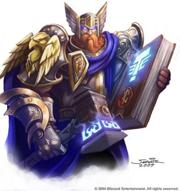
CONTENTS
Foreword
Contents
Overview
Race
Lore with the most relevance to Dwarves.
Section I: In the beginning...
Section II: The Awakening
Section III: War of the Three Hammers
Section IV: First and Second Wars
Section V: The Third War and Pre-WoW years
Section VI: World of Warcraft, BC, and WotLK
Section VII: The Cataclysm
Section VIII: Other Important Events
Traits
Reasons for racial traits
Racism and Sexism
Personalities
Dwarven Clan Honor: Clan, Oath, Obligation
- Miserliness
- Priestly Honor (The Honor of Gods)
- Warrior Honor (The Honor of Iron)
- Guild Honor (The Honor of Gold)
- Liege Honor
- Vassal Honor
What do I need to do to create a dwarf?
Types of Status
Clothing
Weapons
Beards
The Twelve Commandments of Playing Dwarves
Dwarves on the Surface
The Life of a Dwarf
Children
Coming of Age
Marriage
Adult Life
Death
Dwarven Society
The Dominions
The Caste System
Titles
Dwarven Relations with Other Races
The Warrior Tradition: Defending the Clan
Dwarven trade goods
Dwarven Slang
Class Choices
Dwarfen Professions
Brewer's Craftguild
Dwarfen Temperament
Names, names, names
Faith
Things to remember
The Dwarven Accent
Sources
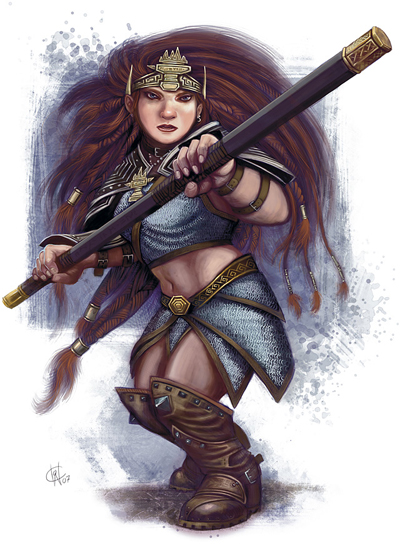
Overview
Dwarves are one of the older races of Azeroth. They were originally Earthen infected with the Curse of Flesh, turning them to the Dwarves we know now.
Dwarf clan membership devolves matrilineal and all clans other than royal ones (in which the chief elder is the King) have a grand matriarch that rules over the council composed of clan elders. This means that a dwarf belongs to the clan of his mother.
Dwarves are a subterranean race that live both in mountains and under the lands that humans have claimed for their own. Dwarves are long-lived and put a great emphasis on the importance of the past. Both honor and the clan are very important to dwarves, who will die before allowing dishonor to themselves or their clans. While dwarves are slow to make friends outside their family and clan, once the bonds of friendship are forged with a dwarf they last until broken by death.
Wildhammers are Shamanistic, druidistic and some (but very very few) practice the Holy Light. They kind of take the role of the Night Elves and Tauren in the Eastern Kingdoms, bringing nature worship.
The Dark Irons have, until recently, and perhaps still, worshiped the Elemental Being Ragnaros as a god. Now that he has been banished, it remains to be seen what they are.
Race
There are a few races of dwarves, but only 3 are commonly seen (the others being Earthen, Iron, Steel and Frost).
The most commonly seen are:
Bronzebeard. WoW playable, they live underground in Ironforge and worship the Holy Light. They interact with the Alliance more often than their cousins, and have a special interest in Archaeology, mining and engineering.
Wildhammer. Cousins to the Bronzebeards, they originally lived in Grim Batol, which was tainted in the War of 3 Hammers, and then moved further north, establishing Aerie Peak in the Hinterlands. They get along with High Elves more than the rest of the Dwarves, and also have a special relationship with the Gyphons of the area.
The Dark Irons. They are the “black sheep” of the family. They have been at unofficial war with the other two clans for several hundred years. They summoned Ragnaros into Azeroth, and live in the burning remains. They practice Sorcery, and their armor and weapons are generally made of the ore that their name comes from, Dark Iron.
This guide is a result of research done, wowiki guides, blizzard posts, forums and general lore on dwarves. So not all of this will be found in the actual world of Warcraft lore. See it therefor as an inspirational guide more than anything else. The actual various wiki’s on dwarves are sadly short.

CONTENTS
Foreword
Contents
Overview
Race
Lore with the most relevance to Dwarves.
Section I: In the beginning...
Section II: The Awakening
Section III: War of the Three Hammers
Section IV: First and Second Wars
Section V: The Third War and Pre-WoW years
Section VI: World of Warcraft, BC, and WotLK
Section VII: The Cataclysm
Section VIII: Other Important Events
Traits
Reasons for racial traits
Racism and Sexism
Personalities
Dwarven Clan Honor: Clan, Oath, Obligation
- Miserliness
- Priestly Honor (The Honor of Gods)
- Warrior Honor (The Honor of Iron)
- Guild Honor (The Honor of Gold)
- Liege Honor
- Vassal Honor
What do I need to do to create a dwarf?
Types of Status
Clothing
Weapons
Beards
The Twelve Commandments of Playing Dwarves
Dwarves on the Surface
The Life of a Dwarf
Children
Coming of Age
Marriage
Adult Life
Death
Dwarven Society
The Dominions
The Caste System
Titles
Dwarven Relations with Other Races
The Warrior Tradition: Defending the Clan
Dwarven trade goods
Dwarven Slang
Class Choices
Dwarfen Professions
Brewer's Craftguild
Dwarfen Temperament
Names, names, names
Faith
Things to remember
The Dwarven Accent
Sources

Overview
Dwarves are one of the older races of Azeroth. They were originally Earthen infected with the Curse of Flesh, turning them to the Dwarves we know now.
Dwarf clan membership devolves matrilineal and all clans other than royal ones (in which the chief elder is the King) have a grand matriarch that rules over the council composed of clan elders. This means that a dwarf belongs to the clan of his mother.
Dwarves are a subterranean race that live both in mountains and under the lands that humans have claimed for their own. Dwarves are long-lived and put a great emphasis on the importance of the past. Both honor and the clan are very important to dwarves, who will die before allowing dishonor to themselves or their clans. While dwarves are slow to make friends outside their family and clan, once the bonds of friendship are forged with a dwarf they last until broken by death.
Wildhammers are Shamanistic, druidistic and some (but very very few) practice the Holy Light. They kind of take the role of the Night Elves and Tauren in the Eastern Kingdoms, bringing nature worship.
The Dark Irons have, until recently, and perhaps still, worshiped the Elemental Being Ragnaros as a god. Now that he has been banished, it remains to be seen what they are.
Race
There are a few races of dwarves, but only 3 are commonly seen (the others being Earthen, Iron, Steel and Frost).
The most commonly seen are:
Bronzebeard. WoW playable, they live underground in Ironforge and worship the Holy Light. They interact with the Alliance more often than their cousins, and have a special interest in Archaeology, mining and engineering.
Wildhammer. Cousins to the Bronzebeards, they originally lived in Grim Batol, which was tainted in the War of 3 Hammers, and then moved further north, establishing Aerie Peak in the Hinterlands. They get along with High Elves more than the rest of the Dwarves, and also have a special relationship with the Gyphons of the area.
The Dark Irons. They are the “black sheep” of the family. They have been at unofficial war with the other two clans for several hundred years. They summoned Ragnaros into Azeroth, and live in the burning remains. They practice Sorcery, and their armor and weapons are generally made of the ore that their name comes from, Dark Iron.
 Re: How to roleplay a dwarf : General guide
Re: How to roleplay a dwarf : General guide
Lore with the most relevance to Dwarves.
Section I: In the beginning...
Dwarves, along with Troggs, are descended from the Earthen. The Earthen were created by the Titans to shape and maintain the earth of Azeroth. The oldest reference to Earthen in Blizzard's Lore timeline is the War of the Ancients. A group of Earthen were convinced to join the Night Elves against the Burning Legion by some time traveling heroes (/wrists). The initial commander, Desdel Stareye, was xenophobic and refused to use any other race to their fullest extent. When he died in battle, Jarod Shadowsong (Maiev's younger brother, also the guy you rescue at the end of the Hyjal Quest line) takes over and corrects the mistakes Stareye made, mending the relationship between the Earthen and Night Elves. After the war, the Earthen went back into hibernation.
In character, I once witnessed a Dwarf berate an a Night Elf over this. Its important to note this is ancient history at this point. A Dwarven character alive in game couldn't have been alive at this point. These are events that your character would likely be aware of, but probably wouldn't feel one way or another about in terms of the Earthen's treatment by Commander Stareye. It'd be like the someone living in Athens, Greece today being mad that Sparta attacked his city over 5000 years ago. Sure you could be mad about, but it would still be weird.

Section II: The Awakening
The Earthen after the war, go back into hibernation for ~7500 years (2500 years prior to the Opening of the Dark Portal). They awaken in Uldaman to find themselves changed from stone to having smooth skin, genders, etc. They had become mortal creatures due to the Curse of Flesh, as was revealed much later during Brann Bronzebeard's research in Northrend. The "Earthen" held almost no memory of their previous lives and left Uldaman collectively.
The exact time line is unknown, but the changed Earthen encountered Stromgardian Humans at around what is believe ~1800, who called them "dwarves." Thereby giving them their namesake, teaching them common, and introducing the Holy Light to them. Human culture heavily influences early Dwarven culture. The dwarves during this time frame discover the city of Ironforge and inhabit it. Not much else is elaborated on during until much later during the War of the Three Hammers. It is likely safe to assume that Dwarven culture was developed during this era.
Again, it is important to note that this time frame is not something your character could have lived through, but would know likely about. What is important to draw from this though is that true "dwarven" civilization is not as ancient as elven or even human civilization and that their history as Earthen was lost until only a few years ago. It was the discovery of their lost past as Earthen that drives the dwarven archaeology machine. When Uldaman was discovered, it switched the Dwarven industry from manufacturing to exploration. That is something that would impact your character, especially if you are a Bronzebeard Dwarf. Does your character agree with that decision, to search for lost and dangerous items while there are looming threats like the Horde and Burning Legion? Does that opinion with stand after King Magni's death at the hands of a Titan Artifact? That is something you'll need to decide on as character.
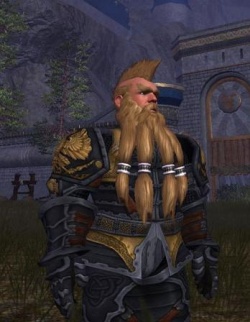
Section III: War of the Three Hammers
In Blizzard speak, "a bunch of boring culture building happens then suddenly BLAM! WAR MUTHA FUCKA." Basically, the next elaborated piece of Dwarven history happens ~230 prior to the opening of the Dark Portal (about 2170 year after the Awakening) and it's cultural impacts are much more immediate than the other sections previously covered. While it is remotely possible that a dwarf alive in WoW could have been alive during the War of the Three Hammers, as dwarves live ~250-300 years, your character would essentially be at the very peak end of their lifespan (like ~105 in human years) and likely decrepit and old. So unless you are in an RP nursing home, I'd seriously suggest avoiding that taboo.
What is known about Dwarven society is that there were three prominent clans of Dwarves: Wildhammer, Dark Iron, and Bronzebeard. All three of the Clans lived in Ironforge at this point vying for favor and power. Modimus Anvilmar was the King at this point in time and ruled all three Clans, and when he suddenly dies without a clear heir, the tensions between the three clans boil over and a war breaks out. The Bronzebeard's end up expelling the Dark Irons and the Wildhammer from Ironforge.
The Dark Irons move south to the Redridge Mountains and the Wildhammers move north and found Grim Batol. Unwilling to accept defeat, The Dark Iron Emperor launches a two pronged attack on Ironforge and Grim Batol an unknown number of years after the fact. The Dark Irons are soundly defeated at Ironforge, but manage to breach the gates of Grim Batol. During the battle of Grim Batol, the Thane of the Wildhammers, Khardos Wildhammer, slays the Dark Iron Sorceress and Empress, Modgud. Her death forever taints Grim Batol with shadowy apparitions and magic, an event that would forever change the Wildhammer Clan.
With the Dark Irons reeling, the united Wildhammer and Bronzebeards turn towards the Dark Iron capitol in the south. Desperate, the Dark Irons attempt to summon a powerful demon, but instead summon Ragnaros, the Firelord by mistake. The explosion caused by the summoning formed the areas known as Burning Steppes and the Searing Gorge. Seeing this, the Wildhammer and Bronzebeards return home rather than face Ragnaros. The Dark Irons are then enslaved by Ragnaros (for the most part anyway). The Wildhammers find that Grim Batol is no longer habitable and are forever scarred by the horrors they came back to in their city as a result of Modgud's taint, going so far as to refuse the offer from the Bronzebeard's to live in Ironforge again, and going north to the Aerie Peak to live above ground and eventually fly on Gryphons.
This is probably the single most important piece of lore for your dwarf character, regardless of Clan affiliation, that occurs prior to the Second War. I will break up the impact into 3 sub sections to make it easier to understand depending on the clan you role play your dwarf as being from:
Bronzebeard: The Bronzebeards are ultimately the least affected by the War of the Three Hammers. Being the victors, they didn't have to change anything about their culture or leave their homeland. However, the actions of the Dark Irons during the war both to them and to the Wildhammers has caused a hatred that has lasted over two centuries. How does your character feel about the Dark Irons? Lost cousins enslaved against their will, have their crimes been paid for in their slavery to Ragnaros? Or do those rotten Dark Irons deserve to be killed to the last man, woman, and child?
Wildhammer: Arguably the most changed culturally from the War of the Three Hammers. The Wildhammers were driven out by their Bronzebeard cousins. The Dark Irons then came and cursed their new home to such a degree they feared to live underground again. They, who were originally creatures created to shape the earth, took the skies on the backs of gryphons, abandoning restrictive plate armor for lighter or no armor. They are the only Alliance race prior to the Draenei to harness the power of the elements. They changed dramatically to the point they no longer related that well to their Bronzebeard cousins and drifted apart. How does being so different from the other dwarven clans impact your interactions with them?
Dark Iron: Your people have been punished and have paid dearly for their evil deeds. Or do you see them as evil actions at all? Was the only mistake summoning Ragnaros instead of a demon? Do you blame the desperation that drove the Emperor to cast that ritual on the Wildhammers and Bronzebeards? Or do you agree with your new found compatriots that summoning Ragnaros was to blame only on your people? Dark Irons are more likely to have a revisionist history of the War of the Three Hammers. Maybe you even try to hide the past, for instance we once had an RP meeting of dwarves in the Hall of Explorers. One of us was RPing a Dark Iron mage, who emoted shuffling some papers to cover up a copy of the book "The Battle of Grim Batol" during the meeting. You've got a bad rap and whether you are penitent or not, you face two centuries of hatred from your cousins in the Wildhammer and Bronzebeard Clans as a result of the war.
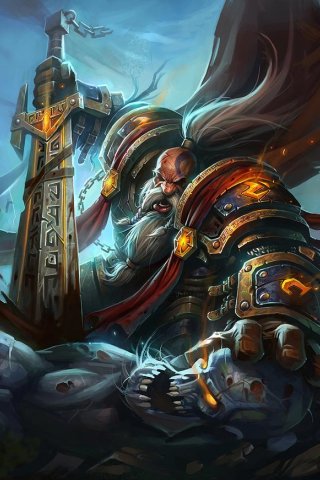
Section I: In the beginning...
Dwarves, along with Troggs, are descended from the Earthen. The Earthen were created by the Titans to shape and maintain the earth of Azeroth. The oldest reference to Earthen in Blizzard's Lore timeline is the War of the Ancients. A group of Earthen were convinced to join the Night Elves against the Burning Legion by some time traveling heroes (/wrists). The initial commander, Desdel Stareye, was xenophobic and refused to use any other race to their fullest extent. When he died in battle, Jarod Shadowsong (Maiev's younger brother, also the guy you rescue at the end of the Hyjal Quest line) takes over and corrects the mistakes Stareye made, mending the relationship between the Earthen and Night Elves. After the war, the Earthen went back into hibernation.
In character, I once witnessed a Dwarf berate an a Night Elf over this. Its important to note this is ancient history at this point. A Dwarven character alive in game couldn't have been alive at this point. These are events that your character would likely be aware of, but probably wouldn't feel one way or another about in terms of the Earthen's treatment by Commander Stareye. It'd be like the someone living in Athens, Greece today being mad that Sparta attacked his city over 5000 years ago. Sure you could be mad about, but it would still be weird.

Section II: The Awakening
The Earthen after the war, go back into hibernation for ~7500 years (2500 years prior to the Opening of the Dark Portal). They awaken in Uldaman to find themselves changed from stone to having smooth skin, genders, etc. They had become mortal creatures due to the Curse of Flesh, as was revealed much later during Brann Bronzebeard's research in Northrend. The "Earthen" held almost no memory of their previous lives and left Uldaman collectively.
The exact time line is unknown, but the changed Earthen encountered Stromgardian Humans at around what is believe ~1800, who called them "dwarves." Thereby giving them their namesake, teaching them common, and introducing the Holy Light to them. Human culture heavily influences early Dwarven culture. The dwarves during this time frame discover the city of Ironforge and inhabit it. Not much else is elaborated on during until much later during the War of the Three Hammers. It is likely safe to assume that Dwarven culture was developed during this era.
Again, it is important to note that this time frame is not something your character could have lived through, but would know likely about. What is important to draw from this though is that true "dwarven" civilization is not as ancient as elven or even human civilization and that their history as Earthen was lost until only a few years ago. It was the discovery of their lost past as Earthen that drives the dwarven archaeology machine. When Uldaman was discovered, it switched the Dwarven industry from manufacturing to exploration. That is something that would impact your character, especially if you are a Bronzebeard Dwarf. Does your character agree with that decision, to search for lost and dangerous items while there are looming threats like the Horde and Burning Legion? Does that opinion with stand after King Magni's death at the hands of a Titan Artifact? That is something you'll need to decide on as character.

Section III: War of the Three Hammers
In Blizzard speak, "a bunch of boring culture building happens then suddenly BLAM! WAR MUTHA FUCKA." Basically, the next elaborated piece of Dwarven history happens ~230 prior to the opening of the Dark Portal (about 2170 year after the Awakening) and it's cultural impacts are much more immediate than the other sections previously covered. While it is remotely possible that a dwarf alive in WoW could have been alive during the War of the Three Hammers, as dwarves live ~250-300 years, your character would essentially be at the very peak end of their lifespan (like ~105 in human years) and likely decrepit and old. So unless you are in an RP nursing home, I'd seriously suggest avoiding that taboo.
What is known about Dwarven society is that there were three prominent clans of Dwarves: Wildhammer, Dark Iron, and Bronzebeard. All three of the Clans lived in Ironforge at this point vying for favor and power. Modimus Anvilmar was the King at this point in time and ruled all three Clans, and when he suddenly dies without a clear heir, the tensions between the three clans boil over and a war breaks out. The Bronzebeard's end up expelling the Dark Irons and the Wildhammer from Ironforge.
The Dark Irons move south to the Redridge Mountains and the Wildhammers move north and found Grim Batol. Unwilling to accept defeat, The Dark Iron Emperor launches a two pronged attack on Ironforge and Grim Batol an unknown number of years after the fact. The Dark Irons are soundly defeated at Ironforge, but manage to breach the gates of Grim Batol. During the battle of Grim Batol, the Thane of the Wildhammers, Khardos Wildhammer, slays the Dark Iron Sorceress and Empress, Modgud. Her death forever taints Grim Batol with shadowy apparitions and magic, an event that would forever change the Wildhammer Clan.
With the Dark Irons reeling, the united Wildhammer and Bronzebeards turn towards the Dark Iron capitol in the south. Desperate, the Dark Irons attempt to summon a powerful demon, but instead summon Ragnaros, the Firelord by mistake. The explosion caused by the summoning formed the areas known as Burning Steppes and the Searing Gorge. Seeing this, the Wildhammer and Bronzebeards return home rather than face Ragnaros. The Dark Irons are then enslaved by Ragnaros (for the most part anyway). The Wildhammers find that Grim Batol is no longer habitable and are forever scarred by the horrors they came back to in their city as a result of Modgud's taint, going so far as to refuse the offer from the Bronzebeard's to live in Ironforge again, and going north to the Aerie Peak to live above ground and eventually fly on Gryphons.
This is probably the single most important piece of lore for your dwarf character, regardless of Clan affiliation, that occurs prior to the Second War. I will break up the impact into 3 sub sections to make it easier to understand depending on the clan you role play your dwarf as being from:
Bronzebeard: The Bronzebeards are ultimately the least affected by the War of the Three Hammers. Being the victors, they didn't have to change anything about their culture or leave their homeland. However, the actions of the Dark Irons during the war both to them and to the Wildhammers has caused a hatred that has lasted over two centuries. How does your character feel about the Dark Irons? Lost cousins enslaved against their will, have their crimes been paid for in their slavery to Ragnaros? Or do those rotten Dark Irons deserve to be killed to the last man, woman, and child?
Wildhammer: Arguably the most changed culturally from the War of the Three Hammers. The Wildhammers were driven out by their Bronzebeard cousins. The Dark Irons then came and cursed their new home to such a degree they feared to live underground again. They, who were originally creatures created to shape the earth, took the skies on the backs of gryphons, abandoning restrictive plate armor for lighter or no armor. They are the only Alliance race prior to the Draenei to harness the power of the elements. They changed dramatically to the point they no longer related that well to their Bronzebeard cousins and drifted apart. How does being so different from the other dwarven clans impact your interactions with them?
Dark Iron: Your people have been punished and have paid dearly for their evil deeds. Or do you see them as evil actions at all? Was the only mistake summoning Ragnaros instead of a demon? Do you blame the desperation that drove the Emperor to cast that ritual on the Wildhammers and Bronzebeards? Or do you agree with your new found compatriots that summoning Ragnaros was to blame only on your people? Dark Irons are more likely to have a revisionist history of the War of the Three Hammers. Maybe you even try to hide the past, for instance we once had an RP meeting of dwarves in the Hall of Explorers. One of us was RPing a Dark Iron mage, who emoted shuffling some papers to cover up a copy of the book "The Battle of Grim Batol" during the meeting. You've got a bad rap and whether you are penitent or not, you face two centuries of hatred from your cousins in the Wildhammer and Bronzebeard Clans as a result of the war.

 Re: How to roleplay a dwarf : General guide
Re: How to roleplay a dwarf : General guide
Section IV: First and Second Wars
The Opening of the Dark Portal would have a delayed impact on the Dwarven people as the initial Orc invasion would happen outside of their lands. Dwarven involvement during the First War was virtually non-existent. While it is possible that a few might have been there when Stormwind fell initially, it is an area of lore that isn't explored all that well. It is known that there was no official involvement of the dwarves from any of the three Clans in that area beyond Wildhammer messengers for Medivh, and gryphons that were loaned to Medivh and the King of Azeroth, Llane Wrynn I, by the same clan as was noted in the Book, The Last Guardian.
As the humans of Stormwind sailed to Lordaeron and the Alliance of Lordaeron was formed, the Dark Iron clan was driven out of the upper reaches of Blackrock Mountain (The upper and lower spires) by the invading orcs, a territory they would never fully reclaim. The orcs solidified a base there while simultaneously sailing across the Great Sea directly at Lordaeron. From the safety of Blackrock Mountain, the orcs drove into Khaz Modan and eventually sealed the Bronzebeard Clan inside of Ironforge, but were unable to break the gates, which forced the orcs to leave a force behind to ensure they didn't escape and hit the Orcish advance from the rear. The Orcs however we're firmly halted at the Thandol Span by the Alliance soldiers mostly comprised of Stromgardian Humans, but also a fair amount of Bronzebeard dwarves, who were north when Ironforge was sealed. The Thandol Span would remain a stalemate for the majority of the Second War.
The Horde group that landed in Lordaeron was met head on by Supreme Commander Anduin Lothar's army. Unable to route them, the orcs decided to go around them and into the Hinterlands, where they came across the Wildhammer gryphon riders, who harried them. Zul'jin, the leader of the Amani trolls, advised Warchief Ogrim Doomhammer of the dwarven stronghold of Aerie Peak. Doomhammer split his forces, leaving just enough to threaten Aerie Peak and eventually forcing Lothar to split his army to defend the Peak and pursue him North over the mountains.
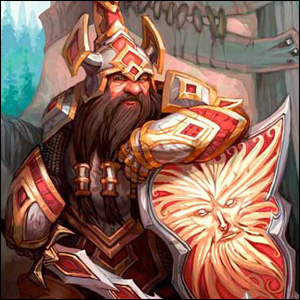
Lothar would stay behind while General Turalyon pursued Doomhammer north, to Quel'thalas. During the battle at Quel'thalas, Khardrun Wildhammer and his gryphon riders came to support them and began to turn the tide, but it was ultimately in vain as orcs riding enslaved red dragons overpowered them (with one brave Wildhammer riding defiantly into the maw of a red dragon yelling in fury).
Eventually, the orcish advance was halted at Capital City and sent reeling due to Gul'dan's betrayal. Doomhammer would retreat all the way to Blackrock mountain for his final stand. The Alliance pursued him and along the way liberated Ironforge, which gladly sent troops to aid them, even guiding them quickly over the mountains as to catch Doomhammer sooner than he expected. Despite the death of Anduin Lothar, the Alliance was victorious and the bulk of the remaining Horde fled across the Dark Portal, which was destroyed.
A few years later, during the reconstruction of Stormwind the Dark Portal was reopened by the Horde. Wildhammer gryphon riders were able to spread the word quickly that the Horde had resurfaced. The Campaign that went across had a large contingent of Bronzebeard and Wildhammer Dwarves with in, including the Wildhammer Thane, Khardrun Wildhammer. It was also noted in Beyond the Dark Portal, that kegs of ale were kept flowing to Honor Hold compliments of King Magni Bronzebeard himself. Ultimately however, the Dark Portal would be sealed off again, trapping them on Draenor for nearly 30 years before it was once again re-opened, this time by the Burning Legion. During that time, it appears the bulk of the Wildhammer went to Wildhammer Stronghold to face the Illidari whilst the Bronzebeard dwarves mostly stayed in Honor Hold, though there are a few at the Allerian Stronghold as well.
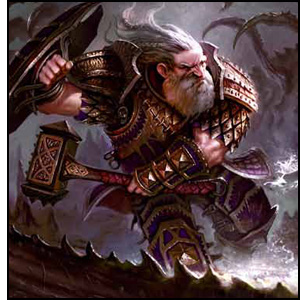
These events are things that would have had a major impact on your dwarven character. Dwarves reach adulthood at ~40 years of age so any adult dwarf would have likely been impacted by these events even if you didn't actively participate in them. You should probably answer the following questions at the very least regardless of clan:
How old was my dwarf when this happened?
Where was I during these events?
How did these events affect me?
While you should be asking those questions continually as you make any back story, in some cases your character might not care about early dwarf history or even the War of the Three Hammers, however the attempted genocide of your people by a race of alien invaders is not something your character would realistically not have an opinion on even if the opinion is "I wish they would have finished off the lot you because I hate my own people."
At this point you should also determine if you went beyond the Dark Portal or not. That is an event that would likely change your outlook on life, as the next section (The Third War) will end up changing the the world you left behind dramatically.
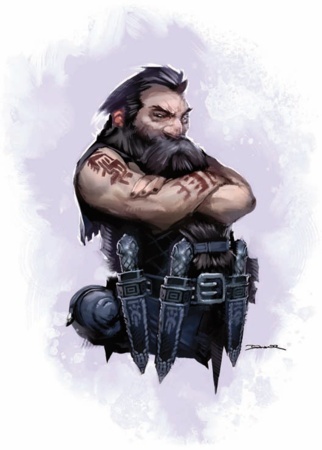
Section V: The Third War and Pre-WoW years
The Wildhammer and Bronzebeard Clans integrate well into the Alliance following the Second War, while the Dark Irons remain at war with the Blackrock Orc Clan (who are at this point aided by Black Dragons) up until the Cataclysm decades later.
Dwarven soldiers are seen at all fronts of the Third War, but most prominently are featured in the fall of Lordaeron (~10 years prior to the Cataclysm). Arthas Menethil, later known as the Lich King, was trained in combat as a boy, by Muradin Bronzebeard, brother of Magni Bronzebeard. Dwarven Mortar crews would end up aiding Arthas many years later as he would attempt to purge the land of the undead Scourge.
When Arthas arrived in Northrend, he would come across his old mentor Muradin again. When Arthas at last found Frostmourne, it was Muradin who attempted to talk him out of taking the blade. Muradin himself was thought dead when Arthas took up Frostmourne, but was discovered to be alive during the campaign that ended the Lich King.
Dwarves also participated in the campaign in Kalimdor against the Burning Legion, even fighting at the Battle of Mount Hyjal.
Khaz Modan, nor any dwarven area was overly affected by the Third War directly, not in the way say a Human or Night Elf would be affected. However, a Wildhammer or Bronzebeard would likely be well aware of these events even if they did not participate in them because they would have a lasting impact on the Alliance as a whole. A Dark Iron dwarf however would likely not have been involved at all and instead would be more focused on the Blackrock Clan and their own private war.
You should definitely answer the question of where your character was during the Third War. We're you a veteran of the war? If so where did you serve? If not, where were you? Those are questions you should be able to answer if asked in character.
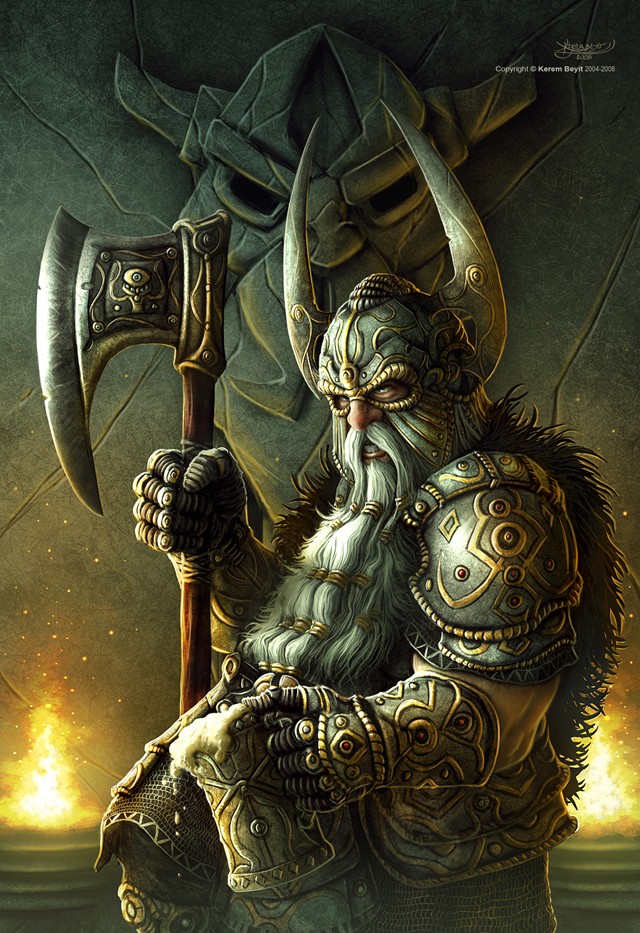
There are a lot of events that occur after the Third War and Prior to WoW to go over so I'll make a list and a brief description:
The New Alliance and Grand Marshal Garithos:
Garithos was charged with retaking Lordaeron from the undead Scourge. He was racist to the core and attempted to kill the Blood Elves under his command many times, resulting in their betrayal of the Alliance. Not as widely known is he thought Dwarves were stupid and incapable as well. King Magni however refused to release dwarves to the direct command of Garithos, likely sparing them a similar fate to the Blood Elves.
Did you serve in the detachment from Ironforge that helped Garithos? Did his racist attitude harm your relationship with humans and/or does it give you sympathy for the Bloods Elves?
Formation of the Scarlet Crusade:
The Scarlet Crusade was not always xenophobic. There was a time when elves and dwarves served it as well. Soon they became corrupt and the all of the dwarves and elves in the Crusade split off to join the Argent Dawn.
Did your dwarf once serve the Scarlet Crusade? How has their corruption impacted you?
Forging of the Ashbringer:
In order to aid in the defeat of the Lich King who he believed killed his younger brother, King Magni Bronzebeard forged the Ashbringer for Alexandros Mograine using what was possibly a piece of a Naaru. While not an event you may have an opinion of one way or another, its a bit of information every Bronzebeard dwarf should know.
Discovery of Uldaman:
the discovery of Uldaman triggered a shift from manufacturing to exploration and discovery as the primary Bronzebeard industry. This was covered a bit earlier, so I won't go into much detail on it.
Dark Iron Invasion:
The Dark Irons finally crept out of their mountain to launch attacks on Bronzebeard territory all over the Eastern Kingdoms. This was the prelude to a full scale invasion a few years later just before and again during the Cataclysm.
Wildhammer's conflict with the Troll:
The Wildhammers saw a resurgence of troll activity in the Hinterlands and have since been locked in battle with them.
The Thorium Brotherhood:
Not all Dark Irons were slaves to the will of Ragnaros. The Thorium Brotherhood escaped Shadowforge City prior to the First War and has been a thorn in the side of the rest of the Dark Iron Clan. After the Third War however, the Thorium Brotherhood began to ally itself with the Horde and the Alliance alike, equipping them with the tools needed to defeat the armies of the Firelord. Does your Dark Iron Dwarf see them as heroes or selfish traitors?
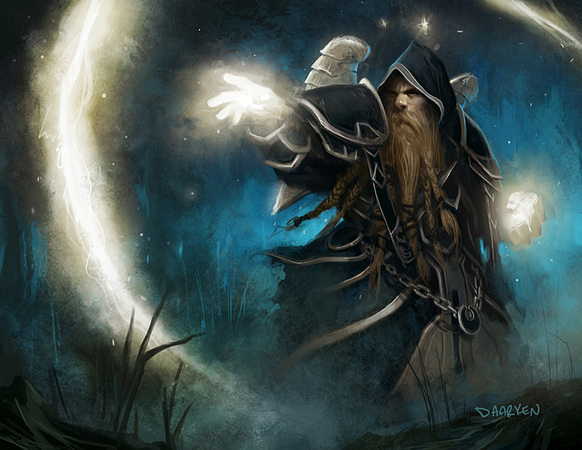
Section VI: World of Warcraft, BC, and WotLK
During vanilla WoW, a lot of events happen to the Dark Iron and Bronzebeard Clans while the Wildhammer's remain engaged with the trolls. The Horde and Alliance both set their sights on Blackrock mountain, home of the Dark Iron dwarves. Their combined might is first directed onto Shadowforge City and Ragnaros. Shadowforge is essentially razed. King Magni's daughter, Moira Bronzebeard, had been kidnapped and presumably brainwashed by the Dark Iron Emperor. As the Emperor is slain, she reveals that she loved him and was pregnant with his child. She remains behind in Shadowforge City. Magni is heartbroken at the news.
The Horde and Alliance would continued their assault until Ragnaros was defeated and temporarily banished him from the material plane. The Blackrock Clan in the spire would also meet a similar fate as Nefarion is slain. The war machine of the Alliance continues its march against its various enemies until the Dark Portal reopens during the Burning Crusade. It is important to note that a lot of archaeological discoveries are made during this time frame. I'd recommend completing the dungeon of Uldaman, completing its quest lines fully, and actually watch the event for the quest involving the Discs of Norgannon for a full understanding. The Explorer's League also plays an important role in discovering information about the Silithid Hives and the Qiraji people during the war in Silithus.
Once the Dark Portal reopened and Burning Legion poured out, the war effort was redirected to Outland. The Bronzebeards and Wildhammers are reunited with their lost friends and those who were trapped would learn of the changes to Azeroth brought about by the Third War. Other than the return of Thane Khardrum Wildhammer, not much else overly important lore wise occurs for dwarves specifically during the Burning Crusade.
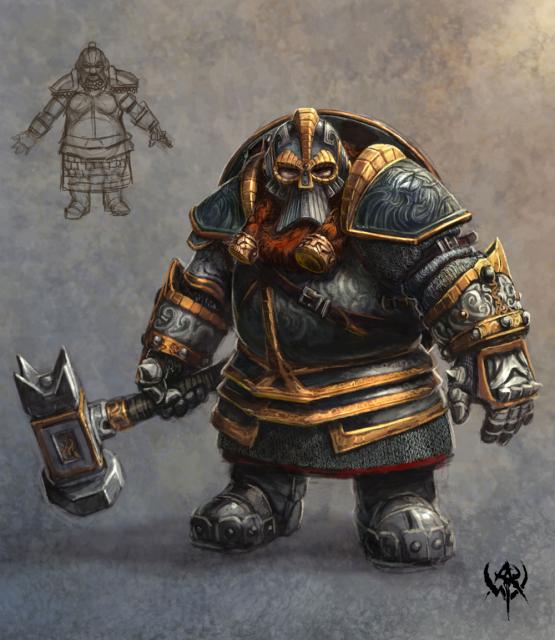
After the fall of Illidan, the Lich King provokes the Horde and the Alliance into attacking him in the north. Keen to know more about the Earthen ancestors, the dwarves take to Northrend with a hunger for knowledge. For complete knowledge and fewer spoilers for those who might not have completed the quests, I will list the quests that are important for you to complete (or if you have completed them and don't remember them, you can read them in the link):
Howling Fjord:
Tools to Get the Job Done- http://www.wowhead.com/quest=11475
We Can Rebuild It- http://www.wowhead.com/quest=11483
We Have the Technology- http://www.wowhead.com/quest=11484
Iron Rune Constructs and You: Rocket Jumping- http://www.wowhead.com/quest=11485
Iron Rune Constructs and You: Collecting Data- http://www.wowhead.com/quest=11489
Iron Rune Constructs and You: The Bluff- http://www.wowhead.com/quest=11491
Lightning Infused Relics- http://www.wowhead.com/quest=11494
The Delicate Sound of Thunder- http://www.wowhead.com/quest=11495
*While the Fjord is not necessary to complete the latter more relevant quests, it sets the backdrop for it so you go "Oh that guy again" later on.
Borean Tundra:
The Gearmaster- http://www.wowhead.com/quest=11798
There are prerequisites to this quest, but you run across it in Borean. It's the first quest line to really reference the "Curse of Flesh."
Storm Peaks:
The entire zone. Essentially every quest chain for the Alliance minus the goblin starting ones has important lore info on the Titans, Northrend's Earthen, the Frostborn Dwarves, the Iron Dwarves, and Muradin Bronzebeard.
The Storm Peaks- http://www.wowhead.com/zone=67#quests
Dungeons:
Halls of Stone
Halls of Lightning
Halls of Stone will have the most lore information. You'll need to take the time to watch the event though. Most pugs won't so if you haven't seen it, take a guild group in and watch the event. I'd recommend completing the zone of Storm Peaks first. Halls of Lightning is more of a conclusion than a lore piece, but I imagine you'd want to see the end if you haven't already.
Raids:
Ulduar
Icecrown Lower Spire
For the ultimate conclusion of the story that began in Howling Fjord, you'll need to complete Ulduar. There is also a bit more on the Titans and more in regards to their plans for Azeroth after the Curse of Flesh hit. Icecrown's Lower Spire also allows you to fight along side the reawakened Muradin Bronzebeard. Definitely an interesting bit, even if it isn't overly important for your character beyond Muradin was there.

The Opening of the Dark Portal would have a delayed impact on the Dwarven people as the initial Orc invasion would happen outside of their lands. Dwarven involvement during the First War was virtually non-existent. While it is possible that a few might have been there when Stormwind fell initially, it is an area of lore that isn't explored all that well. It is known that there was no official involvement of the dwarves from any of the three Clans in that area beyond Wildhammer messengers for Medivh, and gryphons that were loaned to Medivh and the King of Azeroth, Llane Wrynn I, by the same clan as was noted in the Book, The Last Guardian.
As the humans of Stormwind sailed to Lordaeron and the Alliance of Lordaeron was formed, the Dark Iron clan was driven out of the upper reaches of Blackrock Mountain (The upper and lower spires) by the invading orcs, a territory they would never fully reclaim. The orcs solidified a base there while simultaneously sailing across the Great Sea directly at Lordaeron. From the safety of Blackrock Mountain, the orcs drove into Khaz Modan and eventually sealed the Bronzebeard Clan inside of Ironforge, but were unable to break the gates, which forced the orcs to leave a force behind to ensure they didn't escape and hit the Orcish advance from the rear. The Orcs however we're firmly halted at the Thandol Span by the Alliance soldiers mostly comprised of Stromgardian Humans, but also a fair amount of Bronzebeard dwarves, who were north when Ironforge was sealed. The Thandol Span would remain a stalemate for the majority of the Second War.
The Horde group that landed in Lordaeron was met head on by Supreme Commander Anduin Lothar's army. Unable to route them, the orcs decided to go around them and into the Hinterlands, where they came across the Wildhammer gryphon riders, who harried them. Zul'jin, the leader of the Amani trolls, advised Warchief Ogrim Doomhammer of the dwarven stronghold of Aerie Peak. Doomhammer split his forces, leaving just enough to threaten Aerie Peak and eventually forcing Lothar to split his army to defend the Peak and pursue him North over the mountains.

Lothar would stay behind while General Turalyon pursued Doomhammer north, to Quel'thalas. During the battle at Quel'thalas, Khardrun Wildhammer and his gryphon riders came to support them and began to turn the tide, but it was ultimately in vain as orcs riding enslaved red dragons overpowered them (with one brave Wildhammer riding defiantly into the maw of a red dragon yelling in fury).
Eventually, the orcish advance was halted at Capital City and sent reeling due to Gul'dan's betrayal. Doomhammer would retreat all the way to Blackrock mountain for his final stand. The Alliance pursued him and along the way liberated Ironforge, which gladly sent troops to aid them, even guiding them quickly over the mountains as to catch Doomhammer sooner than he expected. Despite the death of Anduin Lothar, the Alliance was victorious and the bulk of the remaining Horde fled across the Dark Portal, which was destroyed.
A few years later, during the reconstruction of Stormwind the Dark Portal was reopened by the Horde. Wildhammer gryphon riders were able to spread the word quickly that the Horde had resurfaced. The Campaign that went across had a large contingent of Bronzebeard and Wildhammer Dwarves with in, including the Wildhammer Thane, Khardrun Wildhammer. It was also noted in Beyond the Dark Portal, that kegs of ale were kept flowing to Honor Hold compliments of King Magni Bronzebeard himself. Ultimately however, the Dark Portal would be sealed off again, trapping them on Draenor for nearly 30 years before it was once again re-opened, this time by the Burning Legion. During that time, it appears the bulk of the Wildhammer went to Wildhammer Stronghold to face the Illidari whilst the Bronzebeard dwarves mostly stayed in Honor Hold, though there are a few at the Allerian Stronghold as well.

These events are things that would have had a major impact on your dwarven character. Dwarves reach adulthood at ~40 years of age so any adult dwarf would have likely been impacted by these events even if you didn't actively participate in them. You should probably answer the following questions at the very least regardless of clan:
How old was my dwarf when this happened?
Where was I during these events?
How did these events affect me?
While you should be asking those questions continually as you make any back story, in some cases your character might not care about early dwarf history or even the War of the Three Hammers, however the attempted genocide of your people by a race of alien invaders is not something your character would realistically not have an opinion on even if the opinion is "I wish they would have finished off the lot you because I hate my own people."
At this point you should also determine if you went beyond the Dark Portal or not. That is an event that would likely change your outlook on life, as the next section (The Third War) will end up changing the the world you left behind dramatically.

Section V: The Third War and Pre-WoW years
The Wildhammer and Bronzebeard Clans integrate well into the Alliance following the Second War, while the Dark Irons remain at war with the Blackrock Orc Clan (who are at this point aided by Black Dragons) up until the Cataclysm decades later.
Dwarven soldiers are seen at all fronts of the Third War, but most prominently are featured in the fall of Lordaeron (~10 years prior to the Cataclysm). Arthas Menethil, later known as the Lich King, was trained in combat as a boy, by Muradin Bronzebeard, brother of Magni Bronzebeard. Dwarven Mortar crews would end up aiding Arthas many years later as he would attempt to purge the land of the undead Scourge.
When Arthas arrived in Northrend, he would come across his old mentor Muradin again. When Arthas at last found Frostmourne, it was Muradin who attempted to talk him out of taking the blade. Muradin himself was thought dead when Arthas took up Frostmourne, but was discovered to be alive during the campaign that ended the Lich King.
Dwarves also participated in the campaign in Kalimdor against the Burning Legion, even fighting at the Battle of Mount Hyjal.
Khaz Modan, nor any dwarven area was overly affected by the Third War directly, not in the way say a Human or Night Elf would be affected. However, a Wildhammer or Bronzebeard would likely be well aware of these events even if they did not participate in them because they would have a lasting impact on the Alliance as a whole. A Dark Iron dwarf however would likely not have been involved at all and instead would be more focused on the Blackrock Clan and their own private war.
You should definitely answer the question of where your character was during the Third War. We're you a veteran of the war? If so where did you serve? If not, where were you? Those are questions you should be able to answer if asked in character.

There are a lot of events that occur after the Third War and Prior to WoW to go over so I'll make a list and a brief description:
The New Alliance and Grand Marshal Garithos:
Garithos was charged with retaking Lordaeron from the undead Scourge. He was racist to the core and attempted to kill the Blood Elves under his command many times, resulting in their betrayal of the Alliance. Not as widely known is he thought Dwarves were stupid and incapable as well. King Magni however refused to release dwarves to the direct command of Garithos, likely sparing them a similar fate to the Blood Elves.
Did you serve in the detachment from Ironforge that helped Garithos? Did his racist attitude harm your relationship with humans and/or does it give you sympathy for the Bloods Elves?
Formation of the Scarlet Crusade:
The Scarlet Crusade was not always xenophobic. There was a time when elves and dwarves served it as well. Soon they became corrupt and the all of the dwarves and elves in the Crusade split off to join the Argent Dawn.
Did your dwarf once serve the Scarlet Crusade? How has their corruption impacted you?
Forging of the Ashbringer:
In order to aid in the defeat of the Lich King who he believed killed his younger brother, King Magni Bronzebeard forged the Ashbringer for Alexandros Mograine using what was possibly a piece of a Naaru. While not an event you may have an opinion of one way or another, its a bit of information every Bronzebeard dwarf should know.
Discovery of Uldaman:
the discovery of Uldaman triggered a shift from manufacturing to exploration and discovery as the primary Bronzebeard industry. This was covered a bit earlier, so I won't go into much detail on it.
Dark Iron Invasion:
The Dark Irons finally crept out of their mountain to launch attacks on Bronzebeard territory all over the Eastern Kingdoms. This was the prelude to a full scale invasion a few years later just before and again during the Cataclysm.
Wildhammer's conflict with the Troll:
The Wildhammers saw a resurgence of troll activity in the Hinterlands and have since been locked in battle with them.
The Thorium Brotherhood:
Not all Dark Irons were slaves to the will of Ragnaros. The Thorium Brotherhood escaped Shadowforge City prior to the First War and has been a thorn in the side of the rest of the Dark Iron Clan. After the Third War however, the Thorium Brotherhood began to ally itself with the Horde and the Alliance alike, equipping them with the tools needed to defeat the armies of the Firelord. Does your Dark Iron Dwarf see them as heroes or selfish traitors?

Section VI: World of Warcraft, BC, and WotLK
During vanilla WoW, a lot of events happen to the Dark Iron and Bronzebeard Clans while the Wildhammer's remain engaged with the trolls. The Horde and Alliance both set their sights on Blackrock mountain, home of the Dark Iron dwarves. Their combined might is first directed onto Shadowforge City and Ragnaros. Shadowforge is essentially razed. King Magni's daughter, Moira Bronzebeard, had been kidnapped and presumably brainwashed by the Dark Iron Emperor. As the Emperor is slain, she reveals that she loved him and was pregnant with his child. She remains behind in Shadowforge City. Magni is heartbroken at the news.
The Horde and Alliance would continued their assault until Ragnaros was defeated and temporarily banished him from the material plane. The Blackrock Clan in the spire would also meet a similar fate as Nefarion is slain. The war machine of the Alliance continues its march against its various enemies until the Dark Portal reopens during the Burning Crusade. It is important to note that a lot of archaeological discoveries are made during this time frame. I'd recommend completing the dungeon of Uldaman, completing its quest lines fully, and actually watch the event for the quest involving the Discs of Norgannon for a full understanding. The Explorer's League also plays an important role in discovering information about the Silithid Hives and the Qiraji people during the war in Silithus.
Once the Dark Portal reopened and Burning Legion poured out, the war effort was redirected to Outland. The Bronzebeards and Wildhammers are reunited with their lost friends and those who were trapped would learn of the changes to Azeroth brought about by the Third War. Other than the return of Thane Khardrum Wildhammer, not much else overly important lore wise occurs for dwarves specifically during the Burning Crusade.

After the fall of Illidan, the Lich King provokes the Horde and the Alliance into attacking him in the north. Keen to know more about the Earthen ancestors, the dwarves take to Northrend with a hunger for knowledge. For complete knowledge and fewer spoilers for those who might not have completed the quests, I will list the quests that are important for you to complete (or if you have completed them and don't remember them, you can read them in the link):
Howling Fjord:
Tools to Get the Job Done- http://www.wowhead.com/quest=11475
We Can Rebuild It- http://www.wowhead.com/quest=11483
We Have the Technology- http://www.wowhead.com/quest=11484
Iron Rune Constructs and You: Rocket Jumping- http://www.wowhead.com/quest=11485
Iron Rune Constructs and You: Collecting Data- http://www.wowhead.com/quest=11489
Iron Rune Constructs and You: The Bluff- http://www.wowhead.com/quest=11491
Lightning Infused Relics- http://www.wowhead.com/quest=11494
The Delicate Sound of Thunder- http://www.wowhead.com/quest=11495
*While the Fjord is not necessary to complete the latter more relevant quests, it sets the backdrop for it so you go "Oh that guy again" later on.
Borean Tundra:
The Gearmaster- http://www.wowhead.com/quest=11798
There are prerequisites to this quest, but you run across it in Borean. It's the first quest line to really reference the "Curse of Flesh."
Storm Peaks:
The entire zone. Essentially every quest chain for the Alliance minus the goblin starting ones has important lore info on the Titans, Northrend's Earthen, the Frostborn Dwarves, the Iron Dwarves, and Muradin Bronzebeard.
The Storm Peaks- http://www.wowhead.com/zone=67#quests
Dungeons:
Halls of Stone
Halls of Lightning
Halls of Stone will have the most lore information. You'll need to take the time to watch the event though. Most pugs won't so if you haven't seen it, take a guild group in and watch the event. I'd recommend completing the zone of Storm Peaks first. Halls of Lightning is more of a conclusion than a lore piece, but I imagine you'd want to see the end if you haven't already.
Raids:
Ulduar
Icecrown Lower Spire
For the ultimate conclusion of the story that began in Howling Fjord, you'll need to complete Ulduar. There is also a bit more on the Titans and more in regards to their plans for Azeroth after the Curse of Flesh hit. Icecrown's Lower Spire also allows you to fight along side the reawakened Muradin Bronzebeard. Definitely an interesting bit, even if it isn't overly important for your character beyond Muradin was there.

 Re: How to roleplay a dwarf : General guide
Re: How to roleplay a dwarf : General guide
Section VII: The Cataclysm
Shortly after the defeat of Arthas, the Earth began to rumble. Seeking a way to keep Ironforge safe, the Bronzebeard Dwarves turned to their Titan Research. At the behest of Advisor Baelgrum, Magni Bronzebeard attempted to use a titan scroll the he believed would safe Ironforge and was turned into solid diamond, a process that obviously killed him. Seizing this advantage, Moira Thaurissan (Formerly Moira Bronzebeard) took roughly half of the Dark Iron people and invaded Ironforge. It is unclear where Muradin and Brann were during this time.
Moira held the people of Ironforge hostage, including the visiting Prince of Stormwind, Anduin Wrynn. During a dinner with the Prince she reveals that she was never brainwashed and loved the Emperor because he respected her, unlike her father Magni (talk about Daddy issues). Varian Wrynn, enraged, launches a covert mission with SI:7 to kill Moira and liberate Ironforge. As Varian is about to execute Moira, Anduin talks his father out of it. Though Moira and her infant son are technically the legitimate successors to the throne of Ironforge and Shadowforge, Varian, as a condition of her defeat forbade her from taking full power until such a time that she could win the hearts of her people and speak for all dwarves. The Council of the Three Hammers is formed with Moira's Uncle Muridan and Thane Falstad Wildhammer (though for a brief time Khardrun Wildhammer took the position) to guide the dwarven people until Moira presumably met said conditions. After the Cataclysm, the Wildhammer dwarves of the Twilight Highlands, who had drifted out of the influence of Aerie Peak, rejoined the Alliance and currently battle the Horde and Twilight's Hammer that dwell in their homeland.
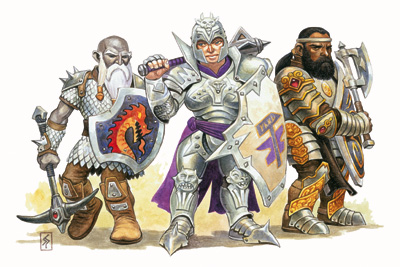
At this point your character, regardless of Clan, will be impacted by this event even if you currently live in the Dwarven District of Stormwind or elsewhere. In the leader short story of The Council Three Hammers: Fire and Iron (the best leader shot story so far imo), reveals a lot about the current state of affairs in Ironforge. The Dark Irons are hated and mistrusted by all but themselves. The Wildhammers are looked upon with mild contempt from their Bronzebeard cousins who are confused by their culture, referring to them with the racial slur of "Butterfly". The Wildhammers dislike being underground and feel restricted in the city and for the most part are confused why they were even brought in to begin with as the Wildhammer's leadership was not in question. The Dwarf world is in chaos, but ironically it is more united than it has been in nearly three centuries. An important choice for all Dwarf RPers is: Do you support your clan above the others or do you wish to see unity amongst all three of the Clans? If you don't care, why?
For more about the current state of affairs, complete the new Cata quests in Dun Morogh, Loch Modan, and the Wetlands.
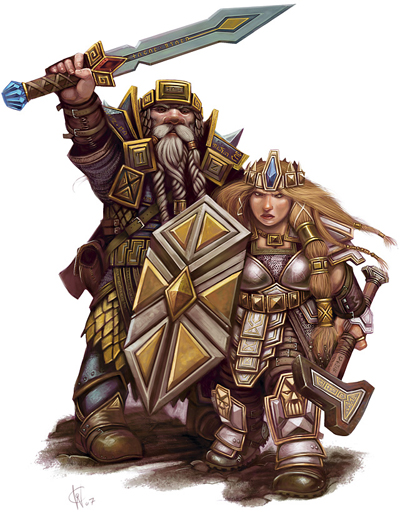
Section VIII: Other Important Events
Thargas Anvilmar
It was revealed that Modimus did have an heir after all. Thargas Anvimal and Hjalmar Anvilmar were descendants of said heir. Thargas teamed up with Varian Wrynn and his companions at Magni's request in the WoW comic series. They came under attack on a journey to Ironforge and it was revealed that Hjalmar had been taken captive by the Dark Irons and the Helm of the Anvilmars stolen. They attempt to rescue Hjalmar, who ultimately sacrifices himself to save the group from an explosive device during the rescue attempt. Hjalmar gave him the helm and told his brother to save the Thandol Span, which he did and continues to do, killing Dark Irons by the droves at his new spot in game by the Thandol Span. Does your character think that Thargas should be the real King of the Dwarves and not Moira, given that he is the last descendant of the final King of Dwarves?
The Destruction of Bael Modan
A relatively peaceful dig site is blown from the face of Azeroth by goblin sappers, killing hundred of Dwarves in the Southern Barrens. Sure, you were digging there against the will of the native Tauren, but cows aren't real people am I right? I'd recommend completing the quests in the Southern Barrens Alliance side for some Dwarven vengeance and stuff to be mad about in character.
The Fall of Dun Garok
The dastardly Forsaken, outnumbering the dwarves 10 to 1 (har har even NPCs zerg), storm the Bronzebeard Stronghold of Dun Garok in a bitter battle which inflicted heavy casualties on the Forsaken and completely annihilated the dwarves. Even after their deaths, the vengeful spirits of the dwarven defenders refused to yield the land to the Forsaken. Eventually the Banshee Queen's troops gave up attempting to inhabit the place. Did you have family there? Even if you didn't, what a heinous act to kill them all to the last man and woman. How does your dwarf feel about that?
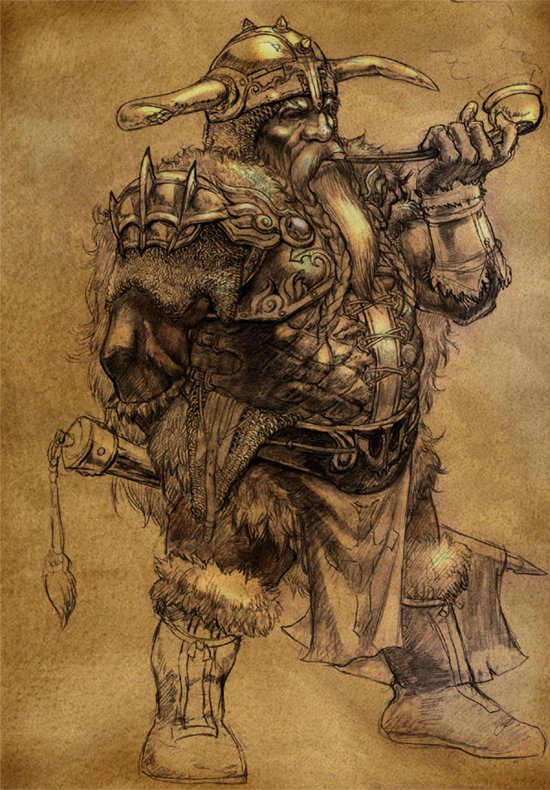
Ragnaros's Alliance with Deathwing
Your former slave master as a Dark Iron, Ragnaros, teamed up with Deathwing, and those who remained loyal to the will of the Firelord, are now essentially used as slaves by the Twilight Cult. Deathwing and his dragonflight along with the Blackrock orcs trapped you an your people in Shadowforge City. Now, they readily join forces with your former Patron. Even though they did not join you, the Dark Irons that remained loyal to Ragnaros are still your people. How does their suffering and Ragnaros's alliance with Deathwing affect you, even with the Firelord being defeated supposedly once and for all?
Traits
You are going to be roleplaying a dwarf so there are a few types of traits you may want to remember:
Dwarves love alcohol, dwarves in bars or taverns without a mug with their hand might raise some eyebrows. Due to their love for alcohol, they don't get drunk that easily, so don't just pass out there after one mug!
Dwarves have a strong relationship with the gnomes. When Gnomeregan fell the dwarves shared their home with the survivors. So if you are going to roleplay a dwarf that does not like gnomes, you should have a good reason to back it up.
Dwarves are born explorers. Finding treasure is in their blood. They can easily tell the quality of a gem or if it's real or not. This can be a very interesting way to RP, and it can be a lot of fun too.
Dwarves were once Earthen, though now they have flesh, they still feel very connected to the earth. Most of their kingdoms are under mountains, though it may seem very dangerous. Dwarves are patient with their work. and build their kingdoms until the last error is corrected. You might want to hang out in cities like Ironforge a lot to show your connection to your roots.
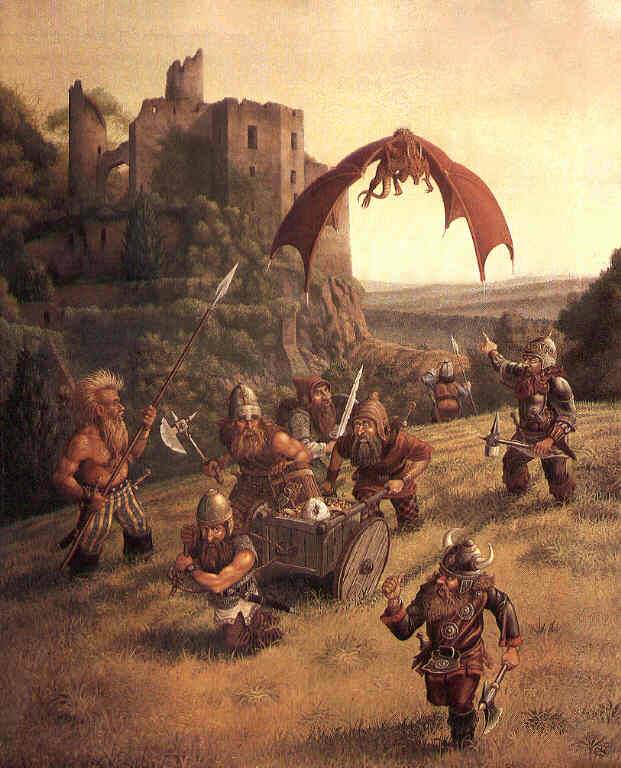
Reasons for racial traits
Dwarves can tap into their Earthen heritage to undergo a temporary partial sclerosis, known to the layman as Stoneform. Not only does this make the dwarf more resistant to injury, it also seals open wounds and eliminates most poisons and infections. The lives of many dwarves have been saved by stoneform.
Soldiers of Ironforge are often recruited from the ranks of industrial laborers. For this reason, Mace and Gun Specialization are common, since having worked in major dwarven industries like metalworking, excavation and hunting, they are already skilled with handling a hammer or powder.
Dwarves are naturally adapted to cold climates, as evidenced by their stocky build and thick hair. Experienced wizards have observed that dwarves have a slight innate Frost Resistance.
Since the founding of the Explorers' League, interest in adventure has been strong in Ironforge. In order to discover more of the world's history, many dwarves leave their homes, ready to explore Azeroth for artifacts of value.
Shortly after the defeat of Arthas, the Earth began to rumble. Seeking a way to keep Ironforge safe, the Bronzebeard Dwarves turned to their Titan Research. At the behest of Advisor Baelgrum, Magni Bronzebeard attempted to use a titan scroll the he believed would safe Ironforge and was turned into solid diamond, a process that obviously killed him. Seizing this advantage, Moira Thaurissan (Formerly Moira Bronzebeard) took roughly half of the Dark Iron people and invaded Ironforge. It is unclear where Muradin and Brann were during this time.
Moira held the people of Ironforge hostage, including the visiting Prince of Stormwind, Anduin Wrynn. During a dinner with the Prince she reveals that she was never brainwashed and loved the Emperor because he respected her, unlike her father Magni (talk about Daddy issues). Varian Wrynn, enraged, launches a covert mission with SI:7 to kill Moira and liberate Ironforge. As Varian is about to execute Moira, Anduin talks his father out of it. Though Moira and her infant son are technically the legitimate successors to the throne of Ironforge and Shadowforge, Varian, as a condition of her defeat forbade her from taking full power until such a time that she could win the hearts of her people and speak for all dwarves. The Council of the Three Hammers is formed with Moira's Uncle Muridan and Thane Falstad Wildhammer (though for a brief time Khardrun Wildhammer took the position) to guide the dwarven people until Moira presumably met said conditions. After the Cataclysm, the Wildhammer dwarves of the Twilight Highlands, who had drifted out of the influence of Aerie Peak, rejoined the Alliance and currently battle the Horde and Twilight's Hammer that dwell in their homeland.

At this point your character, regardless of Clan, will be impacted by this event even if you currently live in the Dwarven District of Stormwind or elsewhere. In the leader short story of The Council Three Hammers: Fire and Iron (the best leader shot story so far imo), reveals a lot about the current state of affairs in Ironforge. The Dark Irons are hated and mistrusted by all but themselves. The Wildhammers are looked upon with mild contempt from their Bronzebeard cousins who are confused by their culture, referring to them with the racial slur of "Butterfly". The Wildhammers dislike being underground and feel restricted in the city and for the most part are confused why they were even brought in to begin with as the Wildhammer's leadership was not in question. The Dwarf world is in chaos, but ironically it is more united than it has been in nearly three centuries. An important choice for all Dwarf RPers is: Do you support your clan above the others or do you wish to see unity amongst all three of the Clans? If you don't care, why?
For more about the current state of affairs, complete the new Cata quests in Dun Morogh, Loch Modan, and the Wetlands.

Section VIII: Other Important Events
Thargas Anvilmar
It was revealed that Modimus did have an heir after all. Thargas Anvimal and Hjalmar Anvilmar were descendants of said heir. Thargas teamed up with Varian Wrynn and his companions at Magni's request in the WoW comic series. They came under attack on a journey to Ironforge and it was revealed that Hjalmar had been taken captive by the Dark Irons and the Helm of the Anvilmars stolen. They attempt to rescue Hjalmar, who ultimately sacrifices himself to save the group from an explosive device during the rescue attempt. Hjalmar gave him the helm and told his brother to save the Thandol Span, which he did and continues to do, killing Dark Irons by the droves at his new spot in game by the Thandol Span. Does your character think that Thargas should be the real King of the Dwarves and not Moira, given that he is the last descendant of the final King of Dwarves?
The Destruction of Bael Modan
A relatively peaceful dig site is blown from the face of Azeroth by goblin sappers, killing hundred of Dwarves in the Southern Barrens. Sure, you were digging there against the will of the native Tauren, but cows aren't real people am I right? I'd recommend completing the quests in the Southern Barrens Alliance side for some Dwarven vengeance and stuff to be mad about in character.
The Fall of Dun Garok
The dastardly Forsaken, outnumbering the dwarves 10 to 1 (har har even NPCs zerg), storm the Bronzebeard Stronghold of Dun Garok in a bitter battle which inflicted heavy casualties on the Forsaken and completely annihilated the dwarves. Even after their deaths, the vengeful spirits of the dwarven defenders refused to yield the land to the Forsaken. Eventually the Banshee Queen's troops gave up attempting to inhabit the place. Did you have family there? Even if you didn't, what a heinous act to kill them all to the last man and woman. How does your dwarf feel about that?

Ragnaros's Alliance with Deathwing
Your former slave master as a Dark Iron, Ragnaros, teamed up with Deathwing, and those who remained loyal to the will of the Firelord, are now essentially used as slaves by the Twilight Cult. Deathwing and his dragonflight along with the Blackrock orcs trapped you an your people in Shadowforge City. Now, they readily join forces with your former Patron. Even though they did not join you, the Dark Irons that remained loyal to Ragnaros are still your people. How does their suffering and Ragnaros's alliance with Deathwing affect you, even with the Firelord being defeated supposedly once and for all?
Traits
You are going to be roleplaying a dwarf so there are a few types of traits you may want to remember:
Dwarves love alcohol, dwarves in bars or taverns without a mug with their hand might raise some eyebrows. Due to their love for alcohol, they don't get drunk that easily, so don't just pass out there after one mug!
Dwarves have a strong relationship with the gnomes. When Gnomeregan fell the dwarves shared their home with the survivors. So if you are going to roleplay a dwarf that does not like gnomes, you should have a good reason to back it up.
Dwarves are born explorers. Finding treasure is in their blood. They can easily tell the quality of a gem or if it's real or not. This can be a very interesting way to RP, and it can be a lot of fun too.
Dwarves were once Earthen, though now they have flesh, they still feel very connected to the earth. Most of their kingdoms are under mountains, though it may seem very dangerous. Dwarves are patient with their work. and build their kingdoms until the last error is corrected. You might want to hang out in cities like Ironforge a lot to show your connection to your roots.

Reasons for racial traits
Dwarves can tap into their Earthen heritage to undergo a temporary partial sclerosis, known to the layman as Stoneform. Not only does this make the dwarf more resistant to injury, it also seals open wounds and eliminates most poisons and infections. The lives of many dwarves have been saved by stoneform.
Soldiers of Ironforge are often recruited from the ranks of industrial laborers. For this reason, Mace and Gun Specialization are common, since having worked in major dwarven industries like metalworking, excavation and hunting, they are already skilled with handling a hammer or powder.
Dwarves are naturally adapted to cold climates, as evidenced by their stocky build and thick hair. Experienced wizards have observed that dwarves have a slight innate Frost Resistance.
Since the founding of the Explorers' League, interest in adventure has been strong in Ironforge. In order to discover more of the world's history, many dwarves leave their homes, ready to explore Azeroth for artifacts of value.
 Re: How to roleplay a dwarf : General guide
Re: How to roleplay a dwarf : General guide
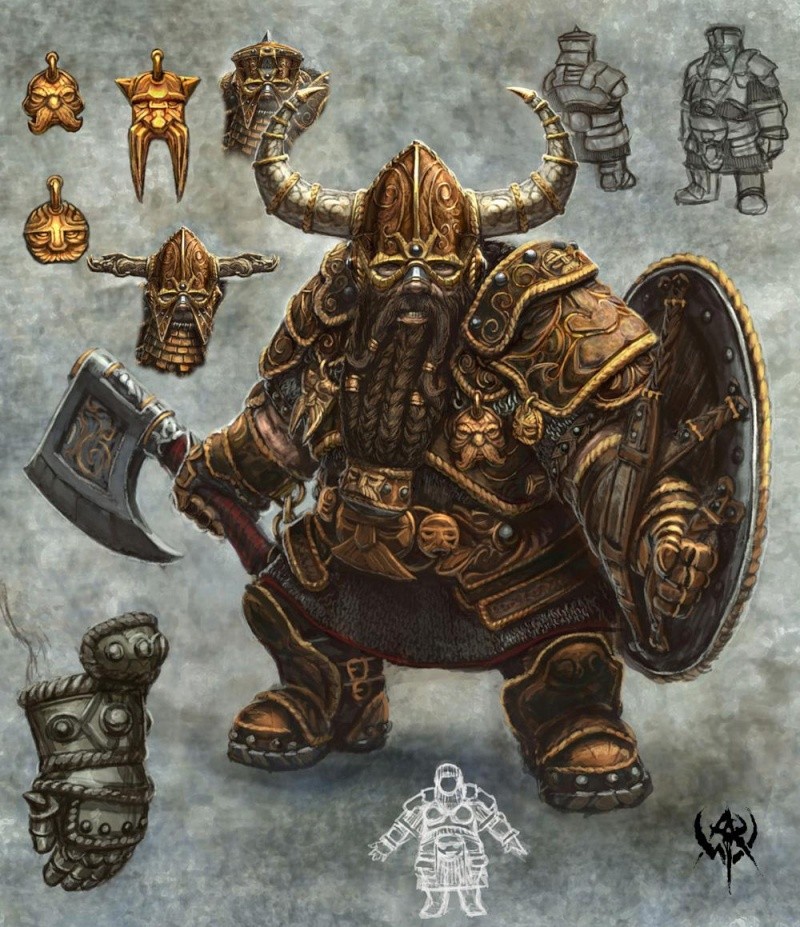
Racism and Sexism
Dwarves do not think of all races as equal; when a Dwarf is mad he can spit out the real things he thinks about some races,"Ya fragile Elves ain't even worth anythin' to the Alliance! All ye do is hug trees and complain 'bout loggin'!" Dwarves do not believe in all the nature and magic things, they call it "tricks", and do not appreciate races that use them much less worship them (this is far less true about the shamanistic Wildhammer dwarves). It is debatable that Dwarven men do not like their women, and sometimes try to get a date from another race. Many jokes were created about Dwarven women breaking razors on their leg hair.
Personalities
Dwarves do not have many different personalities like the humans or orcs. Most feel the same to an event, but don't let that hold your dwarf back. If you really wanted to, you can make your own personality for your dwarf, but it would be best for you to include some of the following dwarven traits:
Dwarves are a suspicious kind, it takes a lot to gain their trust; mostly from elves and draenei. Dwarves (with exception to Dark Iron dwarves) do not like "magical" stuff, they prefer an axe or/and an gun.
Dwarves are kind, protective and loving. A dwarf is a stalwart defender, he would rather die protecting the weak and innocent than seeing them get hurt.
Ironforge Dwarves like guns and cannons. If a dwarf encounters a serious threat, he does not hesitate to fill it's head with thorium and the air with the smell of burnt gunpowder.
Ironforge Dwarves feel more comfortable underground, it could be that the greatest treasures are found deep down in the mountains, or of their earth heritage. Either way, if a dwarf sent you a letter that requires your presence, the location would most likely be a well known fortress under a mountain. Wildhammer dwarves prefer more open-air settlements
Dwarves are rough, tough, and sometimes a bit grumpy.
Dwarves love ale, a filled mug for them is a filled heart. They become very friendly after some ale, if you want a dwarf to like you make sure you make you first impression on him in a bar with fine dwarf ale.
Dwarves are stubborn, when they decide on something, they are hard to convince otherwise. A Dwarf which wants something done, -Will- get it done. If he doesn't.... Well if he doesnt, most of the time he will die trying.
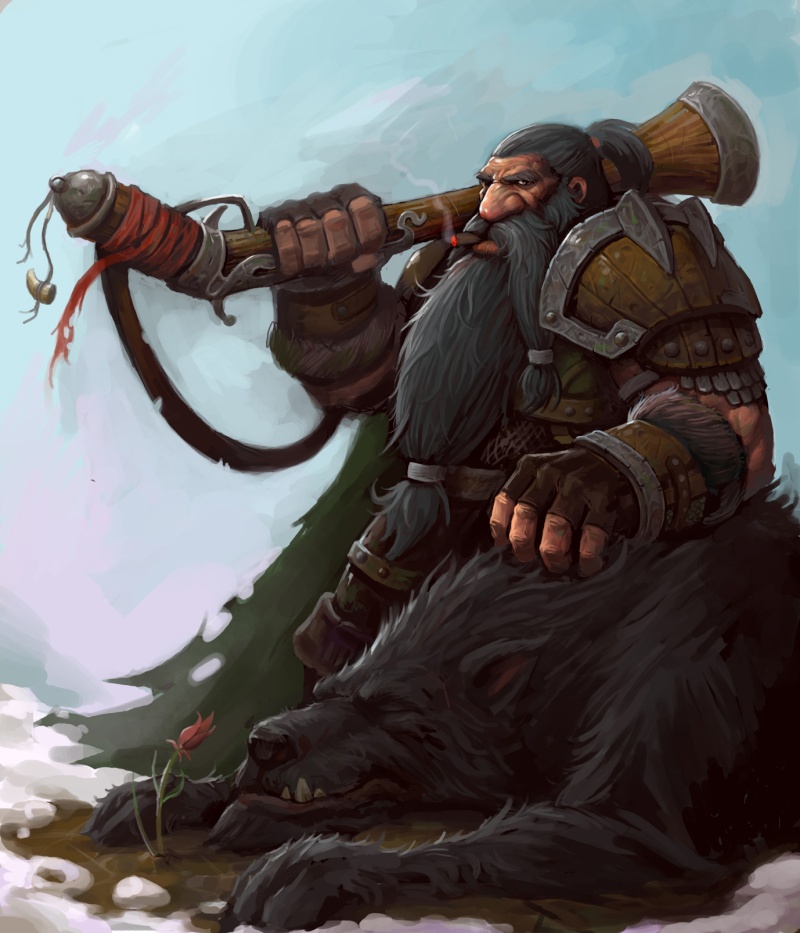
 Re: How to roleplay a dwarf : General guide
Re: How to roleplay a dwarf : General guide
Dwarven Clan Honor: Clan, Oath, Obligation
While all dwarves have great respect for the lives of themselves and each other, their honor
and mutual obligation holds dwarven society together. Any dwarf would rather die than see
dishonor come upon themselves, their family or their clan. Although clan honor is something
that all dwarves are taught about as children, it is really a fundamental part of their psychology.
Although dwarves without this training would not understand why they are bound by the
constraints of this disad, they would still be required to take it.
Your Clan is your life, your honor, your brethren.
• Without the clan, a dwarf is nothing. A rock by itself is nothing more than a stone, swept
around by the wind and water. A thousand rocks fused together by unbreakable bonds are a
mountain. Storms pass it by and the sea breaks against its shoals.
• Never betray the Clan: Betray it not by acting. Betray it not by failing to act. Betray it not
by deed. Betray it not by word, sign or inscription.
• Never kill a member of the clan. To slay one's own brethren is to slay one's ancestors. To
slay one's ancestors is to slay one's self.
• All disputes within the Clan must be resolved within the Clan when possible.
• All outcasts to the Clan will not be chased or hunted but will not be permitted in the same
space as true clansman. While outcasts can never return to the clan, they deserve pity since
they can not join with the ancestors after death.
Your Oath is your blood, your honor, your worth.
• Never break a dwarven blood oath.
• All blood oaths by a clansman shall be honored by the Clan.
Unto Obligation and responsibility is due the respect of ages.
• Respect and importance in dwarven society is based on obligation not privilege. Respect
must be given to those of any race who take on great obligation.
• A dwarf that shows disrespect for those who deserve praise must deliver a blood apology.
• A dwarf must insist that an insulting person deliver a blood apology if the target of the insult
is someone of great honor. (A blood apology is an apology where the person seeking
forgiveness cuts their own wrist or hand as a token of sincerity. For game purposes, this
person would not be able to use their hand/arm until bandaged.) A dwarf will never insist
that someone deliver a blood apology if the dwarf is the target of the insult.
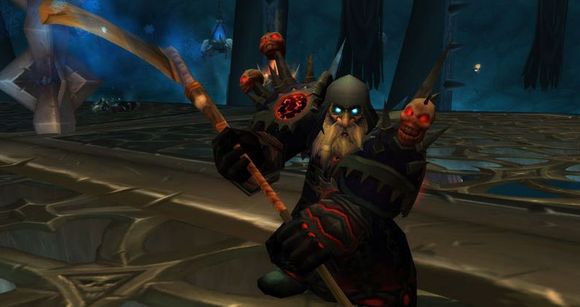
Miserliness
Dwarves have a great love for gold and other fine treasures and have a very hard time giving
it away. Furthermore, dwarves care greatly for the wealth of the clan, and seeming like a
spendthrift is extremely dishonorable.
The only exception to this is that dwarves are permitted to spend money on blessed weapons (and permanent magical items that are also blessed) since having a blessed weapon or holy item is a symbol of great honor among the dwarves.
Never forget who possesses the honor of nations:
• All civilized (those from the civilized races of humans and dwarves) rulers should be
considered honorable until shown otherwise.
When given the opportunity, dwarves are known to give large expensive gifts either from one clan to another or from one family to another. This is done to show the great wealth of the family or clan. This is not done very frequently and would never be done in human lands.
(Some dwarves have a greater understanding of how honor is practiced by other races and may be more forgiving for the lack of not being presented with such. )
• One who voluntarily serves an honorable ruler shall be granted the honor of their liege until
they show that they deserve different treatment.
• Any who has saved the life of a member of the clan should be considered honorable until
proven otherwise.
• Any who has earned the respect of a great many others (Social Distinction or Prominence)
should be considered honorable until shown otherwise.
• All dwarves should be considered honorable until proven otherwise.
• Orcs and the like, vicious animals and the like are not considered honorable unless otherwise demonstrated.
Grant the rights of honor when they are due:
• All rulers have the right of respect from their subjects. Those with lordly honor will respond
with righteous indignation to any sign of disrespect from a subject to their honorable liege.
• Honorable greetings are due to any honorable guests. Such guests will be treated well and
given the protection of the clan.
• A honorable ruler may disagree with advice, but counsel given by a honorable guest, friend
or advisor should neither be ignored or casually disregarded.
• An honorable enemy should not be slain unless it is necessary for the safety of the clan. See
that mercy is granted from your clan and allies when it is honorably requested.
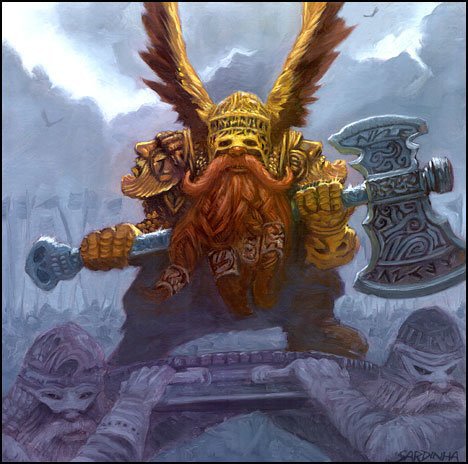
The place of a ruler is the leader and guardian of the clan:
• Justice should be dealt out fairly and honorably. The honor of the clan depends upon its
reputation for fair judgment.
• You must respect the laws of other rulers
• Although some dwarves practice deceit, even when telling the truth, a honorable ruler never
deliberately deceives another unless it is necessary for the protection of the clan.
• No threat to the clan can be ignored. It must be eliminated if possible. Otherwise, it must be
reported as soon as possible.
• No possible benefit to the clan can be ignored. If it can be taken without significant risk or
cost, then take the benefit.
• The ruler is the leader and guardian of the clan. The clan must always come before the
person of the leader. However, others also are necessary for the continuation of the clan.
The priest, the warrior, the guildsman and the common clansman are all integral to the clan
and this should never be forgotten.
While all dwarves have great respect for the lives of themselves and each other, their honor
and mutual obligation holds dwarven society together. Any dwarf would rather die than see
dishonor come upon themselves, their family or their clan. Although clan honor is something
that all dwarves are taught about as children, it is really a fundamental part of their psychology.
Although dwarves without this training would not understand why they are bound by the
constraints of this disad, they would still be required to take it.
Your Clan is your life, your honor, your brethren.
• Without the clan, a dwarf is nothing. A rock by itself is nothing more than a stone, swept
around by the wind and water. A thousand rocks fused together by unbreakable bonds are a
mountain. Storms pass it by and the sea breaks against its shoals.
• Never betray the Clan: Betray it not by acting. Betray it not by failing to act. Betray it not
by deed. Betray it not by word, sign or inscription.
• Never kill a member of the clan. To slay one's own brethren is to slay one's ancestors. To
slay one's ancestors is to slay one's self.
• All disputes within the Clan must be resolved within the Clan when possible.
• All outcasts to the Clan will not be chased or hunted but will not be permitted in the same
space as true clansman. While outcasts can never return to the clan, they deserve pity since
they can not join with the ancestors after death.
Your Oath is your blood, your honor, your worth.
• Never break a dwarven blood oath.
• All blood oaths by a clansman shall be honored by the Clan.
Unto Obligation and responsibility is due the respect of ages.
• Respect and importance in dwarven society is based on obligation not privilege. Respect
must be given to those of any race who take on great obligation.
• A dwarf that shows disrespect for those who deserve praise must deliver a blood apology.
• A dwarf must insist that an insulting person deliver a blood apology if the target of the insult
is someone of great honor. (A blood apology is an apology where the person seeking
forgiveness cuts their own wrist or hand as a token of sincerity. For game purposes, this
person would not be able to use their hand/arm until bandaged.) A dwarf will never insist
that someone deliver a blood apology if the dwarf is the target of the insult.

Miserliness
Dwarves have a great love for gold and other fine treasures and have a very hard time giving
it away. Furthermore, dwarves care greatly for the wealth of the clan, and seeming like a
spendthrift is extremely dishonorable.
The only exception to this is that dwarves are permitted to spend money on blessed weapons (and permanent magical items that are also blessed) since having a blessed weapon or holy item is a symbol of great honor among the dwarves.
Never forget who possesses the honor of nations:
• All civilized (those from the civilized races of humans and dwarves) rulers should be
considered honorable until shown otherwise.
When given the opportunity, dwarves are known to give large expensive gifts either from one clan to another or from one family to another. This is done to show the great wealth of the family or clan. This is not done very frequently and would never be done in human lands.
(Some dwarves have a greater understanding of how honor is practiced by other races and may be more forgiving for the lack of not being presented with such. )
• One who voluntarily serves an honorable ruler shall be granted the honor of their liege until
they show that they deserve different treatment.
• Any who has saved the life of a member of the clan should be considered honorable until
proven otherwise.
• Any who has earned the respect of a great many others (Social Distinction or Prominence)
should be considered honorable until shown otherwise.
• All dwarves should be considered honorable until proven otherwise.
• Orcs and the like, vicious animals and the like are not considered honorable unless otherwise demonstrated.
Grant the rights of honor when they are due:
• All rulers have the right of respect from their subjects. Those with lordly honor will respond
with righteous indignation to any sign of disrespect from a subject to their honorable liege.
• Honorable greetings are due to any honorable guests. Such guests will be treated well and
given the protection of the clan.
• A honorable ruler may disagree with advice, but counsel given by a honorable guest, friend
or advisor should neither be ignored or casually disregarded.
• An honorable enemy should not be slain unless it is necessary for the safety of the clan. See
that mercy is granted from your clan and allies when it is honorably requested.

The place of a ruler is the leader and guardian of the clan:
• Justice should be dealt out fairly and honorably. The honor of the clan depends upon its
reputation for fair judgment.
• You must respect the laws of other rulers
• Although some dwarves practice deceit, even when telling the truth, a honorable ruler never
deliberately deceives another unless it is necessary for the protection of the clan.
• No threat to the clan can be ignored. It must be eliminated if possible. Otherwise, it must be
reported as soon as possible.
• No possible benefit to the clan can be ignored. If it can be taken without significant risk or
cost, then take the benefit.
• The ruler is the leader and guardian of the clan. The clan must always come before the
person of the leader. However, others also are necessary for the continuation of the clan.
The priest, the warrior, the guildsman and the common clansman are all integral to the clan
and this should never be forgotten.
 Re: How to roleplay a dwarf : General guide
Re: How to roleplay a dwarf : General guide
Priestly Honor (The Honor of Gods)
Never forget who possesses the honor of gods:
• All civilized priests should be considered honorable until shown otherwise.
• All dwarves should be considered honorable until proven otherwise.
• Orcs and the like, vicious animals and the like are not considered honorable unless otherwise demonstrated.
Grant the rights of honor when they are due:
• The life of any honorable person should be saved unless it would put the safety of the clan in
jeopardy.
• A priest must both advocate and grant mercy to the honorable who request it.
• All spirits, immortals and divine messengers must be granted the utmost respect no matter
what their origin until they demonstrate that other behavior is necessary. Nonetheless, under
no conditions may any deity be disparaged.
The place of a priest is the spiritual guardian of the clan:
• Never neglect a troubled member of the clan. Trouble for a clansman is trouble for the clan.
• The place of the priesthood is to council, advise and protect. Should any ruler appear to need
advice, the priest must honestly and respectfully see that their opinions are communicated.
• Rulers should be given respect for they are the chosen of the gods and the ancestors.
• However, without the priest, the clan would be not like a mountain but like a piece of wood
adrift on the sea.
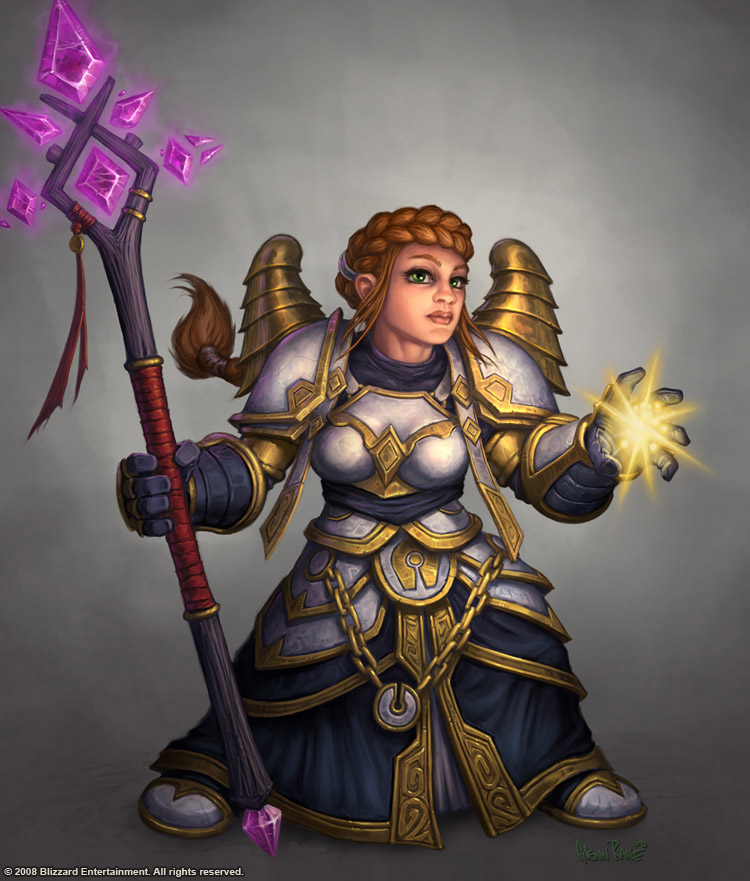
Warrior Honor (The Honor of Iron)
Never forget who possesses the honor of steel:
• All civilized warriors (those from the civilized races of humans and dwarves) should
be considered honorable until shown otherwise. Warriors may be considered dishonorable
when they violate the requirements of Clan or Warrior honor. (Some dwarves have a greater
understanding of how honor is practiced by other races and may be more forgiving.)
• All dwarves should be considered honorable until proven otherwise.
• Orcs and the like, vicious animals and the like are not considered honorable unless otherwise demonstrated.
Grant the rights of honor when they are due:
• All honorable warriors shall be given mercy if it is requested.
• No honorable warriors may be slain unless it is necessary for the safety of the clan.
• • All honorable warriors shall be given mercy if it is requested.
• No honorable warriors may be slain unless it is necessary for the safety of the clan.
• An honorable warrior that requests an honorable duel must be granted it. An honorable duel
is one where two warriors face in single combat preferably with poisoned weapons.
Honorable duels are almost always fought to subdue but either warrior may request that the
other fight to kill.
• An honorable person who goes beyond the normal bounds of effort to save the life of a
dwarven Warrior is owed a life-debt by that warrior. The warrior must make all attempts
short of putting his or her clan in danger to return the favor. (Risking one's own life to safe
the dwarven warrior is the typical definition of "going beyond the normal bounds of effort",
although those who heal enemies or fulfill obligations that would have meant certain death
may also find themselves with a friend who will stick around. Sapping a dwarven warrior
that is about to go on a suicidal mission is very risky; depending on the feelings of the
warrior and the honor in the mission, you will either get a very grateful warrior or a lifelong
enemy.)
The place of a warrior is the guardian of the clan:
• Any danger to the clan or members of the clan must be met immediately and without
hesitation. A dwarven warrior will not retreat unless all non-Iron Dominion members of the
clan have already withdrawn.
• Priests and Rulers of all sorts should be given respect for they are the speakers of the gods
and the chosen of the ancestors.
• However, the warrior is the steel of the clan without him, it would be at the mercy of the
beasts of the world.
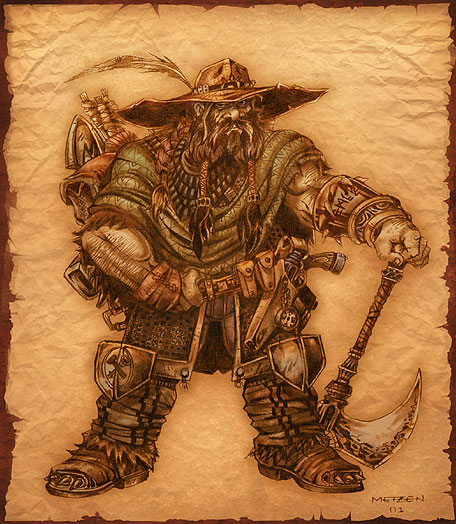
Guild Honor (The Honor of Gold)
Never forget who possesses the honor of gold:
• All civilized craftsmen should be considered honorable until shown otherwise.
• All dwarves should be considered honorable until proven otherwise.
• Orcs and the like, vicious animals and the like are not considered honorable unless otherwise demonstrated.
Grant the rights of honor when they are due:
• A craftsman’s word is his contract is his livelihood. The word of an honorable craftsman
will be taken and respected.
• Never disparage the work of an honorable craftsman.
• No truly great piece of workmanship can be destroyed unless it is necessary for the safety of
the clan.
• An honorable person who grants a uncontracted boon to a dwarven craftsman must be repaid
in kind.
The place of a guildsman is the provider of the clan:
• Your word is your contract is your livelihood. Once an agreement is reached, you will make
all possible efforts short of jeopardizing the safety of the clan to fulfill that contract.
• If you are unable to fulfill a contract, you must make all conceivable efforts to reach a new
contract that releases you from the bounds of the one that you were unable to fulfill, short of
jeopardizing the safety of the clan.
• If you are unable to fulfill a contract and the other contractor is not negotiating honorably,
then you must make all possible attempts to fulfill what aspects of the contact you are
capable of (or, less preferably, an equivalently valuable contract) short of jeopardizing the
safety of the clan.
• If you are unable to fulfill a contract and the other contractor releases you from that contract
on generous terms, you must make all possible attempts to fulfill what aspects of the contact
you are capable of (or, less preferably, an equivalently valuable contract) short of
jeopardizing the safety of the clan.
• When your opinion regarding an appraisal is asked, it may either be withheld or given
honestly. You may never lie regarding something’s worth. Naturally, you would never ask
something’s true value in negotiation and would be mildly insulted by such a request.
• Warriors, Priests, Rulers of all sorts should be given respect for they are the defenders of the
clan, the speakers of the gods and the chosen of the ancestors.
• However, the guildsman is the provider of the clan. Without the guildsman famine and
poverty would defeat the clan as surely as any beastly foe.
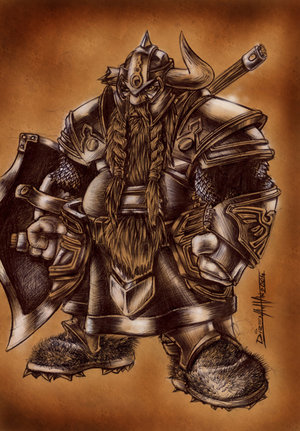
Liege Honor:
• All subjects have the right of dutiful leadership form their rulers. Never treat your subjects
cruelly or casually.
• The honor of your vassals reflects upon your own. You will not dishonor your vassals, nor
will you force them to dishonor themselves. One who dishonors your vassal, dishonors you
as well.
Vassal Honor:
• All rulers have the right of allegiance from their subjects. Always respect your liege.
• The honor of your liege reflects upon your own. You will not dishonor your liege, nor will
you allow your actions to dishonor your liege. One who dishonors your liege, dishonors your
as well.
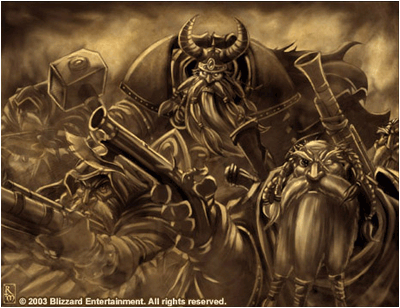
Never forget who possesses the honor of gods:
• All civilized priests should be considered honorable until shown otherwise.
• All dwarves should be considered honorable until proven otherwise.
• Orcs and the like, vicious animals and the like are not considered honorable unless otherwise demonstrated.
Grant the rights of honor when they are due:
• The life of any honorable person should be saved unless it would put the safety of the clan in
jeopardy.
• A priest must both advocate and grant mercy to the honorable who request it.
• All spirits, immortals and divine messengers must be granted the utmost respect no matter
what their origin until they demonstrate that other behavior is necessary. Nonetheless, under
no conditions may any deity be disparaged.
The place of a priest is the spiritual guardian of the clan:
• Never neglect a troubled member of the clan. Trouble for a clansman is trouble for the clan.
• The place of the priesthood is to council, advise and protect. Should any ruler appear to need
advice, the priest must honestly and respectfully see that their opinions are communicated.
• Rulers should be given respect for they are the chosen of the gods and the ancestors.
• However, without the priest, the clan would be not like a mountain but like a piece of wood
adrift on the sea.

Warrior Honor (The Honor of Iron)
Never forget who possesses the honor of steel:
• All civilized warriors (those from the civilized races of humans and dwarves) should
be considered honorable until shown otherwise. Warriors may be considered dishonorable
when they violate the requirements of Clan or Warrior honor. (Some dwarves have a greater
understanding of how honor is practiced by other races and may be more forgiving.)
• All dwarves should be considered honorable until proven otherwise.
• Orcs and the like, vicious animals and the like are not considered honorable unless otherwise demonstrated.
Grant the rights of honor when they are due:
• All honorable warriors shall be given mercy if it is requested.
• No honorable warriors may be slain unless it is necessary for the safety of the clan.
• • All honorable warriors shall be given mercy if it is requested.
• No honorable warriors may be slain unless it is necessary for the safety of the clan.
• An honorable warrior that requests an honorable duel must be granted it. An honorable duel
is one where two warriors face in single combat preferably with poisoned weapons.
Honorable duels are almost always fought to subdue but either warrior may request that the
other fight to kill.
• An honorable person who goes beyond the normal bounds of effort to save the life of a
dwarven Warrior is owed a life-debt by that warrior. The warrior must make all attempts
short of putting his or her clan in danger to return the favor. (Risking one's own life to safe
the dwarven warrior is the typical definition of "going beyond the normal bounds of effort",
although those who heal enemies or fulfill obligations that would have meant certain death
may also find themselves with a friend who will stick around. Sapping a dwarven warrior
that is about to go on a suicidal mission is very risky; depending on the feelings of the
warrior and the honor in the mission, you will either get a very grateful warrior or a lifelong
enemy.)
The place of a warrior is the guardian of the clan:
• Any danger to the clan or members of the clan must be met immediately and without
hesitation. A dwarven warrior will not retreat unless all non-Iron Dominion members of the
clan have already withdrawn.
• Priests and Rulers of all sorts should be given respect for they are the speakers of the gods
and the chosen of the ancestors.
• However, the warrior is the steel of the clan without him, it would be at the mercy of the
beasts of the world.

Guild Honor (The Honor of Gold)
Never forget who possesses the honor of gold:
• All civilized craftsmen should be considered honorable until shown otherwise.
• All dwarves should be considered honorable until proven otherwise.
• Orcs and the like, vicious animals and the like are not considered honorable unless otherwise demonstrated.
Grant the rights of honor when they are due:
• A craftsman’s word is his contract is his livelihood. The word of an honorable craftsman
will be taken and respected.
• Never disparage the work of an honorable craftsman.
• No truly great piece of workmanship can be destroyed unless it is necessary for the safety of
the clan.
• An honorable person who grants a uncontracted boon to a dwarven craftsman must be repaid
in kind.
The place of a guildsman is the provider of the clan:
• Your word is your contract is your livelihood. Once an agreement is reached, you will make
all possible efforts short of jeopardizing the safety of the clan to fulfill that contract.
• If you are unable to fulfill a contract, you must make all conceivable efforts to reach a new
contract that releases you from the bounds of the one that you were unable to fulfill, short of
jeopardizing the safety of the clan.
• If you are unable to fulfill a contract and the other contractor is not negotiating honorably,
then you must make all possible attempts to fulfill what aspects of the contact you are
capable of (or, less preferably, an equivalently valuable contract) short of jeopardizing the
safety of the clan.
• If you are unable to fulfill a contract and the other contractor releases you from that contract
on generous terms, you must make all possible attempts to fulfill what aspects of the contact
you are capable of (or, less preferably, an equivalently valuable contract) short of
jeopardizing the safety of the clan.
• When your opinion regarding an appraisal is asked, it may either be withheld or given
honestly. You may never lie regarding something’s worth. Naturally, you would never ask
something’s true value in negotiation and would be mildly insulted by such a request.
• Warriors, Priests, Rulers of all sorts should be given respect for they are the defenders of the
clan, the speakers of the gods and the chosen of the ancestors.
• However, the guildsman is the provider of the clan. Without the guildsman famine and
poverty would defeat the clan as surely as any beastly foe.

Liege Honor:
• All subjects have the right of dutiful leadership form their rulers. Never treat your subjects
cruelly or casually.
• The honor of your vassals reflects upon your own. You will not dishonor your vassals, nor
will you force them to dishonor themselves. One who dishonors your vassal, dishonors you
as well.
Vassal Honor:
• All rulers have the right of allegiance from their subjects. Always respect your liege.
• The honor of your liege reflects upon your own. You will not dishonor your liege, nor will
you allow your actions to dishonor your liege. One who dishonors your liege, dishonors your
as well.

 Re: How to roleplay a dwarf : General guide
Re: How to roleplay a dwarf : General guide
What do I need to do to create a dwarf?
Creating a dwarven character requires a certain amount of work. Not only do you need to go
through the basic process of creating any character, you also have to pick through a different set
of gods and a wide set of possible honor codes. That all said, the amount of time you need to put
in will vary from character to character. However, there are several things that no dwarf can
enter game without knowing:
• Your Name
• Your Clan
• Your Caste (which will be Clansman, unless you are a noble.)
• Your Dominion
Furthermore, there are a number of other details that you will probably want to figure out if
you are planning on playing the character for longer than a few hours. These will include your
title, your family history (and a short geneology), your liege and exact occupation, along with
any honor codes that you wish to take.
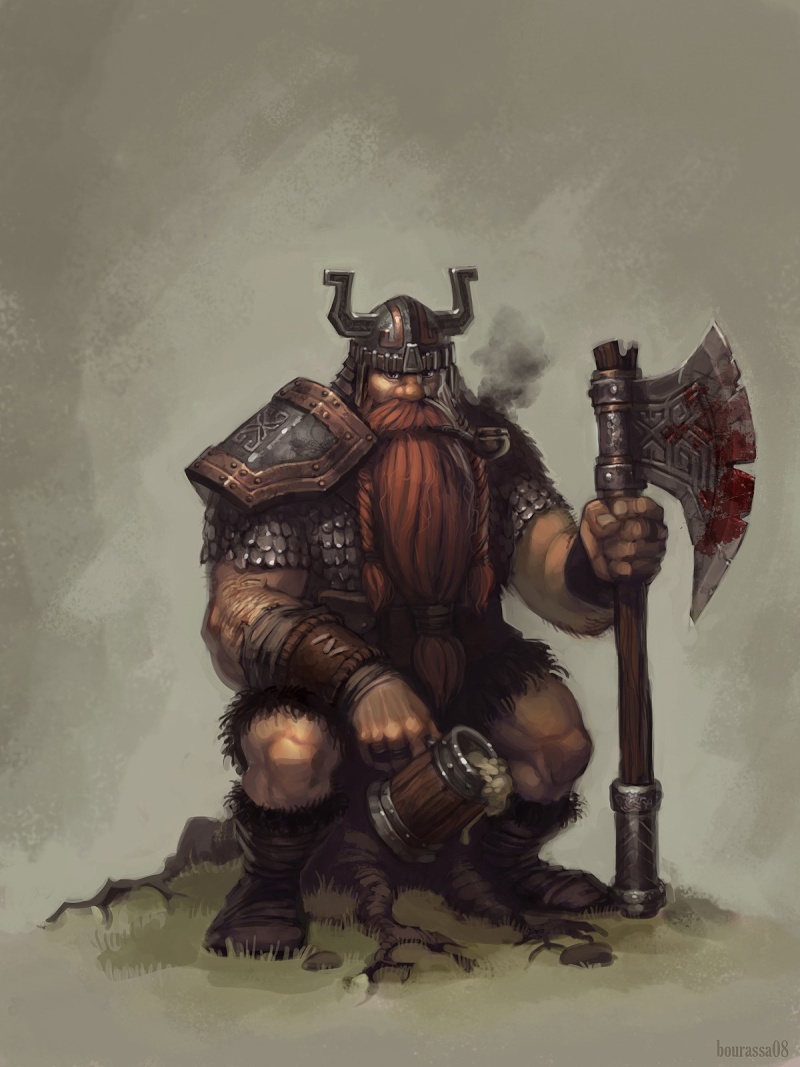
Types of Status
If you want to play a dwarf with status, there are as many ways that dwarves can get status as
humans. Any dwarf that is either noble or royal is likely to have some form of status. (Dwarves
from a royal house will almost always have prominence as a Princess or Prince. Dwarves from a
noble house can have either Prominence or Social Distinction. In either case, Armsbearing is
common among warrior types but depends on the character.) Similarly, status often comes with
knighthood. Dwarves also achieve status through every creative and original way that humans
do, from heroic deeds to success with a trade or business.
Clothing
While dwarven characters are, of course, permitted to wear anything they wish, there are
certain things that help make the character seem more dwarfish. Failing actual armor, leather bracers and belts can also help a dwarven outfit. Furthermore, though clothing styles vary from clan to clan, generally darker colors and earth tones tend to dominate dwarven dress. Dwarves who wish to appear rich are generally best off decorating themselves with gold and gems instead of using bright clothing.
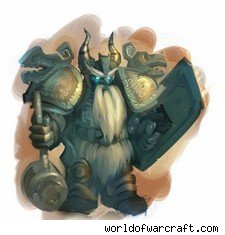
Weapons
The traditional weapons of a dwarf are an ax and a long knife. As a part of the coming of
age, dwarven men are required to make their own set of these weapons. While many dwarves
replace their original weapons with either purchased weapons or better crafted implements made
later on in life, the majority of dwarves will carry these most places they go. Dwarven women
are even more likely to arm themselves though they have the choice of carrying a rod (mace) or
second long knife instead of an ax.
Beards
Not all dwarves have beards. While some women develop small amounts of facial hair,
those generally shave and the average dwarven woman has no facial hair. Dwarven men tend to
grow facial hair much faster than humans do. Although many shave (because long beards get in
the way), they do not do so often, and many dwarven men live in a perpetual state of stubble.
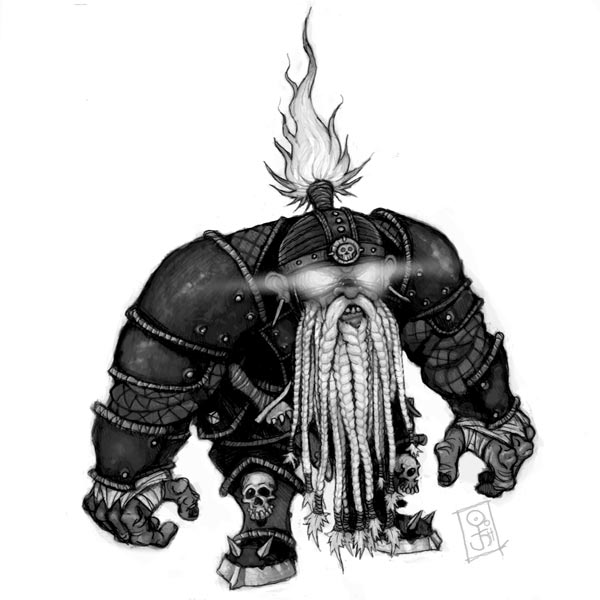
Creating a dwarven character requires a certain amount of work. Not only do you need to go
through the basic process of creating any character, you also have to pick through a different set
of gods and a wide set of possible honor codes. That all said, the amount of time you need to put
in will vary from character to character. However, there are several things that no dwarf can
enter game without knowing:
• Your Name
• Your Clan
• Your Caste (which will be Clansman, unless you are a noble.)
• Your Dominion
Furthermore, there are a number of other details that you will probably want to figure out if
you are planning on playing the character for longer than a few hours. These will include your
title, your family history (and a short geneology), your liege and exact occupation, along with
any honor codes that you wish to take.

Types of Status
If you want to play a dwarf with status, there are as many ways that dwarves can get status as
humans. Any dwarf that is either noble or royal is likely to have some form of status. (Dwarves
from a royal house will almost always have prominence as a Princess or Prince. Dwarves from a
noble house can have either Prominence or Social Distinction. In either case, Armsbearing is
common among warrior types but depends on the character.) Similarly, status often comes with
knighthood. Dwarves also achieve status through every creative and original way that humans
do, from heroic deeds to success with a trade or business.
Clothing
While dwarven characters are, of course, permitted to wear anything they wish, there are
certain things that help make the character seem more dwarfish. Failing actual armor, leather bracers and belts can also help a dwarven outfit. Furthermore, though clothing styles vary from clan to clan, generally darker colors and earth tones tend to dominate dwarven dress. Dwarves who wish to appear rich are generally best off decorating themselves with gold and gems instead of using bright clothing.

Weapons
The traditional weapons of a dwarf are an ax and a long knife. As a part of the coming of
age, dwarven men are required to make their own set of these weapons. While many dwarves
replace their original weapons with either purchased weapons or better crafted implements made
later on in life, the majority of dwarves will carry these most places they go. Dwarven women
are even more likely to arm themselves though they have the choice of carrying a rod (mace) or
second long knife instead of an ax.
Beards
Not all dwarves have beards. While some women develop small amounts of facial hair,
those generally shave and the average dwarven woman has no facial hair. Dwarven men tend to
grow facial hair much faster than humans do. Although many shave (because long beards get in
the way), they do not do so often, and many dwarven men live in a perpetual state of stubble.

 Re: How to roleplay a dwarf : General guide
Re: How to roleplay a dwarf : General guide
The Twelve Commandments of Playing Dwarves:
1) Thou shalt be stoic:
Dwarves live in rock. They are tough and like it.
2) Thou shalt remember the clan:
The clan is central to the life of the dwarf. Dwarves would rather die than see harm come to their clan. Dwarves also generally defer to those with greater honor and responsibility but politely let their leaders know if they disagree.
3) Thou shalt act honorably: Clan, Oath, Obligation.
4) Thou shalt put the lives of other dwarves above all else.
Nothing is more important for a clan without clansman is no clan.
5) Thou shalt be practical.
Dwarves are very down to earth. (Pun intended.) You are not in the practice of denying or concealing things. It is very dwarfish to praise the abilities of people and groups that you do not like. You consider it foolish to degrade someone's ability as a warrior at any point, especially if they are your enemy.
6) Thou shalt not fear death.
Death is the end of life and there is no reason to live if you can not help the clan. Then you must go and join the ancestors. There is also no value in the life of one that does not have a clan to serve. Lastly, nearly every dwarf would wish no more than to die in battle in great service to the clan. Such an honorable death brings honor to your clan, your ancestors and your descendants.
7) Thou shalt take great pride in thy race and thy clan:
Humans really don't understand how dwarves work. That's OK; they don't have to. If you teach them to act honorably, so much the better, but it does little good to get upset if they fail to use the proper etiquette.
 Thou shalt be humble about thy self.
Thou shalt be humble about thy self.
It is dishonorable to brag of your own achievements.
You announce your title to prevent others from dishonoring themselves, not to puff up your own
ego. For example, a Prince of Silverrock might introduce himself to a stranger by saying "I am
Bloodlord Rohan Silverrock, but let me assure you that title merely represents the blood of my
great ancestors and I am but a minor representative of our clan's great leaders."
9) Thou shalt be patient and deliberate (especially as you get old).
Dwarves live a long time. Dwarves are slow to anger and slow to love. Dwarves are not driven by whimsy or impulse.
10) Thou shalt be passionate.
Dwarves are slow to emotion, but the emotion they do feel burns inside them like a forge. It is hard to get a dramatic reaction out of a dwarf but when you threaten or insult something a dwarf loves, the reaction is pretty impressive. In this way, dwarves are also like the earth: it is hard to move the earth or get it to reach; but when the earth does react it is with a great and mighty force to be feared and reckoned with.
11) Dwarves distinguish rank carefully.
Be sure to treat those with status especially well as long as they behave.
12) Thou shalt be respectful.
It is more dishonorable to deliver an undeserved insult that it is to receive one. When dwarves wish to deliver an insult they will almost always phrase it so that it is an opinion instead of an accusation. Instead of calling someone a foolish knave, to avoid forcing an apology, a dwarf would instead say that someone reminded them of a foolish knave.
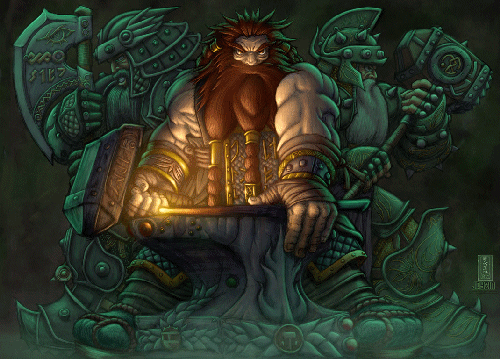
Dwarves on the Surface
Many elements of surface culture will be alien to dwarves. Just as most humans are
unfamiliar with cavern flora and fauna, surface plants and animals will often seem strange to
dwarves. So too will the food, since the dwarven diet consists of things like mushrooms, molds,
lizard meat, and cave fish. Dwarven society also has a very precise set of social norms very
different from that of humans.
Agoraphobia (fear of open spaces) is also common among average dwarves. Just as most
humans are uncomfortable in caves, most dwarves are uncomfortable without a solid ceiling
overhead. However, dwarves found on the surface won't have this problem, for the same reason that severe claustrophobia isn't common among human spelunkers.
The Life of a Dwarf
Dwarves are a very long lived race. Dwarven women live about 200 years on average and
dwarven men live about 180 years on average. Women will occasionally live to about 250 and
have lived to 300 in the past although this is extremely rare.
Children
Dwarves have few fertility problems. Women are fertile twice a year and
their child bearing years last from their early 20's through their 120's. While dwarves are slightly
less likely to conceive children than humans, dwarven women are fundamentally capable of
having as many children as they wish, and the 15-month gestation period is generally easier on
dwarven women than human women, due to their more stout skeletal structure.
Although dwarven women are capable of having many children, feeding them is much harder.
Dwarven children are beloved by the entire clan holding, and the strong dwarven constitution
makes infant mortality less of a problem than in human families. Dwarven parents generally care
for their own children, although the large extended family is extremely helpful both in allowing
the parents to work and in caring for children if something happens to their parents.
Dwarven children grow slowly over 30 years.
Girls reach their full adult height towards the end of their teens, boys in their early 20s. However, dwarven children in their 20s are generally fairly skinny and their shoulders and hips do not reach their proper proportions for another 10 years. By the time they reach their mid-teens, dwarven children require comparatively little care
and spend their time learning the trade they will need in adult life.
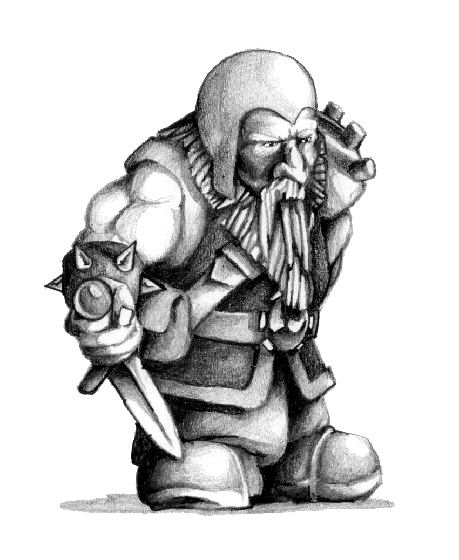
Coming of Age
Around their twentieth birthday, dwarven girls leave their home for a little over a year.
"The Passing", as this time is called, is a very important stage in the life of a young dwarven woman, where she learns the story of their ancestors and the Gods. The Passing ends with a ceremony where
as many family members gather together and the young woman is given her marriage bracelet
which she wears until she gives it to her husband. When this stage is completed, the young
woman returns to her family where she prepares for the far more strenuous test, "the Burning".
Young women are given a full turning (one year) to prepare for the Burning, a series of three
tests. The first test is perform an act of carrying something of the past to the future. Some young
women will repair a damaged structure. Others might learns something of the past and record it
in the hall of histories.
In poorer families, young women frequently have to spend their time with crops, which can qualify as moving the past to the future, but nearly any woman would prefer a more honorable achievement. The second test is to ensure that the young woman can defend the clan. She is given a long knife and either a rod or ax, forged by her father when possible.
She is then placed in a room with food behind her and a hungry beast in front. By any means she
chooses, the young warrior must prevent the beast from devouring the food. Stories tell of a
young priestess of a unknown clan who covered her hands in the food. When the beast came, it
tried to swallow her arm; she resisted the pain and sliced open the beast from the inside with the
knife in her hand.
While the first two tests may be quite difficult, the final test is the most dreaded of all. Barefoot, the young woman must cross a path of burning coals, to retrieve a heavy tablet with her new family crest carved into it.
Between the times when their sisters go through the Passing and the Burning, dwarven boys
go through their own coming of age. Boys are required to participate in "the Testing". During a
three year period of time between their 20th birthday and their 23rd, dwarven boys participate in
three separate tests. The first test is the Test of Ceremony, where a boy is required to perform in
a full year's worth of ceremonies for the first time. The second test is the Test of Steel, where a
boy must forge his own ax and long knife and successfully kill with them. The final test is the
Test of Bone, where a boy is sent out with his knife, ax, clothing and a piece of flint to a cave
where he has never been. He is supposed to live there for a full month when an adult comes and
gets him. After the testing, a boy is not yet considered an adult. Although he is "Tested" and is
given nearly all the respect of an adult in society, he does not reach his adulthood until marriage
and may not participate in a paired leadership position.
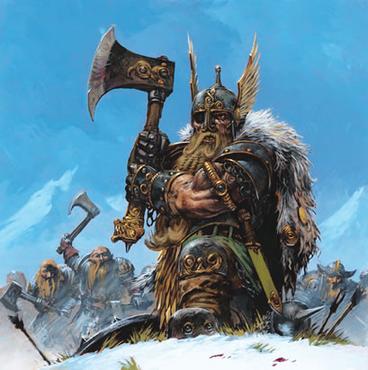
Marriage
Most dwarves marry between the ages of 30 and 60. During the ceremony, the marriage
bracelet is given from the woman to the man. At this time, the man leaves his own family and
joins that of his wife. In cross-clan marriages, the man always joins his wife's clan because the
physically distinct clan markings are passed down from the mother.
During the marriage ceremony itself, gifts are brought from the entire family. Marriage
represents the continuation of the clan and is the one the few times that a dwarven family is
permitted to honorably spend a lot of money. In return for all of the gifts, the bride and groom
present the clan with a gift of their own. The gifts given by the new pair vary greatly but always
represent the joining of past and present to form a new future. Such acts of creation are often
treasured by the entire clan holding and in some cases, actually become holy items of the clan.
Creating a new holy item for the clan holding at one's marriage is one of the most honorable
achievements that a dwarf can commit, short of dying in the clan’s defense.

Adult Life
Both before and shortly after marriage, young dwarves all pursue their own trade. Tasks in a
dwarven community are divided loosely on gender lines. Generally, women are responsible for
growing and the past so they tend to be responsible for agriculture, maintaining family trees,
building structures and defending the clan. The men of a clan are responsible for making and the
present, and thus tend to involve themselves in cooking, crafts, exploring, hunting and seeking
out threats to the clan and destroying them. Regardless, dwarves are very practical and hardly
anyone who shows a real gift for something will be kept from that profession. It should also be
noted that the burdens of leadership, planning, ceremony and child rearing are the provinces of
both sexes.
Most dwarven women prefer to bear all of their children in a 10 year period usually starting
after they reach 50 and usually ending before they reach 100. Since dwarven parents spend a lot
of time raising their children, they do this so they only have to spend 30-50 years of their life
with children.
Even though dwarven mothers spend a great deal of time with their children in the first two
years after they are born, once a baby turns 2, the mother will generally return full time to her
task. Children are usually left in the care of the elder members of the family while they grow up
and thus have access to both elders who can teach as well as other children their age.
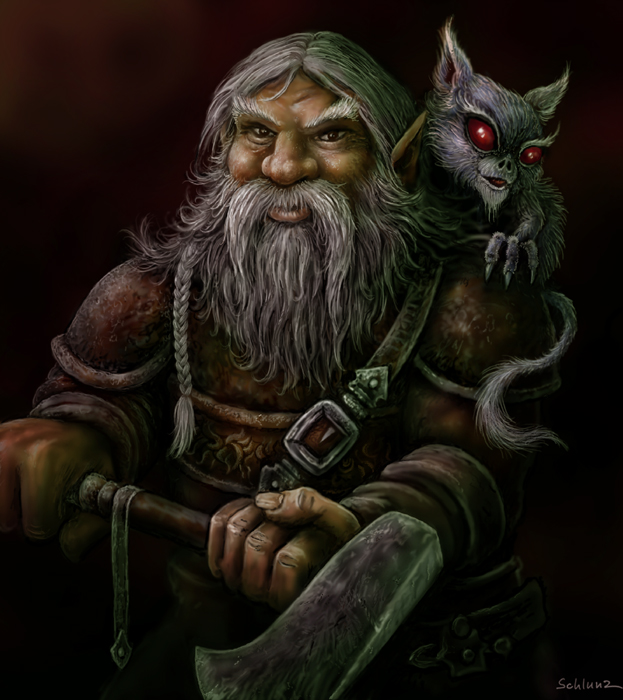
Death
To the dwarves, death is not the barrier that it is to humans. While the dwarves also believe
that they are brought before their gods upon their death, judgment is not their fate.
Instead, the dwarves believe that their souls merely stay upon the spiritual plane for a period of
time until they are allowed to rejoin the clan. Dwarves of great honor are permitted back to the
mortal realm after a very brief sojourn while those of less honor remain with the gods for some
time.
Upon returning to the mortal realm, dwarven spirits merge into the collective ancestral spirit
of the clan. Those who spent less time with the gods retain more of their personality and their
voice can sometimes be heard, almost as an individual, by spiritual ones among them. Those who spent more time with the gods become less personalized and tend to fall more into the great background
consciousness. The very belief that all dwarves will spend eternity with their clan forms part of
the centerpiece of dwarven clan honor and loyalty.
1) Thou shalt be stoic:
Dwarves live in rock. They are tough and like it.
2) Thou shalt remember the clan:
The clan is central to the life of the dwarf. Dwarves would rather die than see harm come to their clan. Dwarves also generally defer to those with greater honor and responsibility but politely let their leaders know if they disagree.
3) Thou shalt act honorably: Clan, Oath, Obligation.
4) Thou shalt put the lives of other dwarves above all else.
Nothing is more important for a clan without clansman is no clan.
5) Thou shalt be practical.
Dwarves are very down to earth. (Pun intended.) You are not in the practice of denying or concealing things. It is very dwarfish to praise the abilities of people and groups that you do not like. You consider it foolish to degrade someone's ability as a warrior at any point, especially if they are your enemy.
6) Thou shalt not fear death.
Death is the end of life and there is no reason to live if you can not help the clan. Then you must go and join the ancestors. There is also no value in the life of one that does not have a clan to serve. Lastly, nearly every dwarf would wish no more than to die in battle in great service to the clan. Such an honorable death brings honor to your clan, your ancestors and your descendants.
7) Thou shalt take great pride in thy race and thy clan:
Humans really don't understand how dwarves work. That's OK; they don't have to. If you teach them to act honorably, so much the better, but it does little good to get upset if they fail to use the proper etiquette.
It is dishonorable to brag of your own achievements.
You announce your title to prevent others from dishonoring themselves, not to puff up your own
ego. For example, a Prince of Silverrock might introduce himself to a stranger by saying "I am
Bloodlord Rohan Silverrock, but let me assure you that title merely represents the blood of my
great ancestors and I am but a minor representative of our clan's great leaders."
9) Thou shalt be patient and deliberate (especially as you get old).
Dwarves live a long time. Dwarves are slow to anger and slow to love. Dwarves are not driven by whimsy or impulse.
10) Thou shalt be passionate.
Dwarves are slow to emotion, but the emotion they do feel burns inside them like a forge. It is hard to get a dramatic reaction out of a dwarf but when you threaten or insult something a dwarf loves, the reaction is pretty impressive. In this way, dwarves are also like the earth: it is hard to move the earth or get it to reach; but when the earth does react it is with a great and mighty force to be feared and reckoned with.
11) Dwarves distinguish rank carefully.
Be sure to treat those with status especially well as long as they behave.
12) Thou shalt be respectful.
It is more dishonorable to deliver an undeserved insult that it is to receive one. When dwarves wish to deliver an insult they will almost always phrase it so that it is an opinion instead of an accusation. Instead of calling someone a foolish knave, to avoid forcing an apology, a dwarf would instead say that someone reminded them of a foolish knave.

Dwarves on the Surface
Many elements of surface culture will be alien to dwarves. Just as most humans are
unfamiliar with cavern flora and fauna, surface plants and animals will often seem strange to
dwarves. So too will the food, since the dwarven diet consists of things like mushrooms, molds,
lizard meat, and cave fish. Dwarven society also has a very precise set of social norms very
different from that of humans.
Agoraphobia (fear of open spaces) is also common among average dwarves. Just as most
humans are uncomfortable in caves, most dwarves are uncomfortable without a solid ceiling
overhead. However, dwarves found on the surface won't have this problem, for the same reason that severe claustrophobia isn't common among human spelunkers.
The Life of a Dwarf
Dwarves are a very long lived race. Dwarven women live about 200 years on average and
dwarven men live about 180 years on average. Women will occasionally live to about 250 and
have lived to 300 in the past although this is extremely rare.
Children
Dwarves have few fertility problems. Women are fertile twice a year and
their child bearing years last from their early 20's through their 120's. While dwarves are slightly
less likely to conceive children than humans, dwarven women are fundamentally capable of
having as many children as they wish, and the 15-month gestation period is generally easier on
dwarven women than human women, due to their more stout skeletal structure.
Although dwarven women are capable of having many children, feeding them is much harder.
Dwarven children are beloved by the entire clan holding, and the strong dwarven constitution
makes infant mortality less of a problem than in human families. Dwarven parents generally care
for their own children, although the large extended family is extremely helpful both in allowing
the parents to work and in caring for children if something happens to their parents.
Dwarven children grow slowly over 30 years.
Girls reach their full adult height towards the end of their teens, boys in their early 20s. However, dwarven children in their 20s are generally fairly skinny and their shoulders and hips do not reach their proper proportions for another 10 years. By the time they reach their mid-teens, dwarven children require comparatively little care
and spend their time learning the trade they will need in adult life.

Coming of Age
Around their twentieth birthday, dwarven girls leave their home for a little over a year.
"The Passing", as this time is called, is a very important stage in the life of a young dwarven woman, where she learns the story of their ancestors and the Gods. The Passing ends with a ceremony where
as many family members gather together and the young woman is given her marriage bracelet
which she wears until she gives it to her husband. When this stage is completed, the young
woman returns to her family where she prepares for the far more strenuous test, "the Burning".
Young women are given a full turning (one year) to prepare for the Burning, a series of three
tests. The first test is perform an act of carrying something of the past to the future. Some young
women will repair a damaged structure. Others might learns something of the past and record it
in the hall of histories.
In poorer families, young women frequently have to spend their time with crops, which can qualify as moving the past to the future, but nearly any woman would prefer a more honorable achievement. The second test is to ensure that the young woman can defend the clan. She is given a long knife and either a rod or ax, forged by her father when possible.
She is then placed in a room with food behind her and a hungry beast in front. By any means she
chooses, the young warrior must prevent the beast from devouring the food. Stories tell of a
young priestess of a unknown clan who covered her hands in the food. When the beast came, it
tried to swallow her arm; she resisted the pain and sliced open the beast from the inside with the
knife in her hand.
While the first two tests may be quite difficult, the final test is the most dreaded of all. Barefoot, the young woman must cross a path of burning coals, to retrieve a heavy tablet with her new family crest carved into it.
Between the times when their sisters go through the Passing and the Burning, dwarven boys
go through their own coming of age. Boys are required to participate in "the Testing". During a
three year period of time between their 20th birthday and their 23rd, dwarven boys participate in
three separate tests. The first test is the Test of Ceremony, where a boy is required to perform in
a full year's worth of ceremonies for the first time. The second test is the Test of Steel, where a
boy must forge his own ax and long knife and successfully kill with them. The final test is the
Test of Bone, where a boy is sent out with his knife, ax, clothing and a piece of flint to a cave
where he has never been. He is supposed to live there for a full month when an adult comes and
gets him. After the testing, a boy is not yet considered an adult. Although he is "Tested" and is
given nearly all the respect of an adult in society, he does not reach his adulthood until marriage
and may not participate in a paired leadership position.

Marriage
Most dwarves marry between the ages of 30 and 60. During the ceremony, the marriage
bracelet is given from the woman to the man. At this time, the man leaves his own family and
joins that of his wife. In cross-clan marriages, the man always joins his wife's clan because the
physically distinct clan markings are passed down from the mother.
During the marriage ceremony itself, gifts are brought from the entire family. Marriage
represents the continuation of the clan and is the one the few times that a dwarven family is
permitted to honorably spend a lot of money. In return for all of the gifts, the bride and groom
present the clan with a gift of their own. The gifts given by the new pair vary greatly but always
represent the joining of past and present to form a new future. Such acts of creation are often
treasured by the entire clan holding and in some cases, actually become holy items of the clan.
Creating a new holy item for the clan holding at one's marriage is one of the most honorable
achievements that a dwarf can commit, short of dying in the clan’s defense.

Adult Life
Both before and shortly after marriage, young dwarves all pursue their own trade. Tasks in a
dwarven community are divided loosely on gender lines. Generally, women are responsible for
growing and the past so they tend to be responsible for agriculture, maintaining family trees,
building structures and defending the clan. The men of a clan are responsible for making and the
present, and thus tend to involve themselves in cooking, crafts, exploring, hunting and seeking
out threats to the clan and destroying them. Regardless, dwarves are very practical and hardly
anyone who shows a real gift for something will be kept from that profession. It should also be
noted that the burdens of leadership, planning, ceremony and child rearing are the provinces of
both sexes.
Most dwarven women prefer to bear all of their children in a 10 year period usually starting
after they reach 50 and usually ending before they reach 100. Since dwarven parents spend a lot
of time raising their children, they do this so they only have to spend 30-50 years of their life
with children.
Even though dwarven mothers spend a great deal of time with their children in the first two
years after they are born, once a baby turns 2, the mother will generally return full time to her
task. Children are usually left in the care of the elder members of the family while they grow up
and thus have access to both elders who can teach as well as other children their age.

Death
To the dwarves, death is not the barrier that it is to humans. While the dwarves also believe
that they are brought before their gods upon their death, judgment is not their fate.
Instead, the dwarves believe that their souls merely stay upon the spiritual plane for a period of
time until they are allowed to rejoin the clan. Dwarves of great honor are permitted back to the
mortal realm after a very brief sojourn while those of less honor remain with the gods for some
time.
Upon returning to the mortal realm, dwarven spirits merge into the collective ancestral spirit
of the clan. Those who spent less time with the gods retain more of their personality and their
voice can sometimes be heard, almost as an individual, by spiritual ones among them. Those who spent more time with the gods become less personalized and tend to fall more into the great background
consciousness. The very belief that all dwarves will spend eternity with their clan forms part of
the centerpiece of dwarven clan honor and loyalty.
 Re: How to roleplay a dwarf : General guide
Re: How to roleplay a dwarf : General guide
Dwarven Society
Dwarven society is complicated at best. All dwarves have numerous connections to their
society. Every dwarf is a member of a clan, the largest social group. To humans, a clan seems
like a cross between a nation and an extended family. However, to dwarves, it also represents
the strongest bonds of honor, mutual history and fanatical devotion.
Every dwarf is also a member of one of the four dominions. A dwarf’s dominion determines
the dwarf’s occupation and position in society. They are described in detail below.
A dwarf is also part of a caste. Caste is determined by birth and is determined by the nobility
of a dwarf’s bloodline.
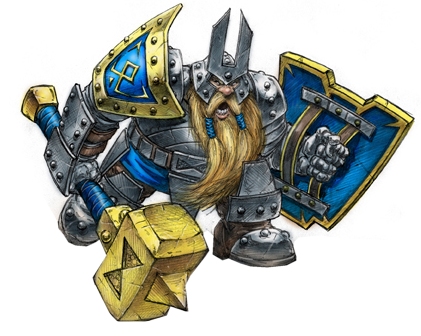
The Dominions
There are four major groups (called dominions) that hold significant power in the typical
dwarven clan. Each of these groups has its own areas of influence and dominates dwarven
society in that area. Although the Highlords are, unquestionably, the most powerful of the
dominions in just about any clan, each has enough power to make the interplay between the
dominions the dominant force in dwarven politics.
Every dwarf has his or her own place in the dominion hierarchy. Ancestry plays a significant
role in the place that a dwarf has in the dominions. The child of a warrior will receive
preferential treatment by the Iron Dominion and a descendant of ten generations of warriors is
assured of an opportunity to achieve a prominent position. However, although ancestry opens
doors to a dominion, it is still necessary to walk through them. Ten generations of priestly
ancestors are necessary for a chance to become a leader, but only a powerful priest will
ever achieve that position. Lastly, although one who possesses only a moderate degree of skill or
potential will be barred from a position if the dwarf has insufficient ancestral claim, the truly
gifted will usually be granted a position.
One’s position or place has a great effect on the life of a dwarf. It not only determines the
respect that others grant you but it also is the basis of your life’s work. Priests need places in the
Holy Dominion to work their prayers. A weaponsmith needs a guildship to practice his art, and a
warrior needs a commission to lead others into battle. Lastly, each dominion has its own
individual code of honor that defines both how members should conduct themselves and how
they relate to members of other dominions. Although no dwarf is required to actually take these
honor codes as disadvantages, any dwarven player should carefully read what is considered
honorable for one in their position.
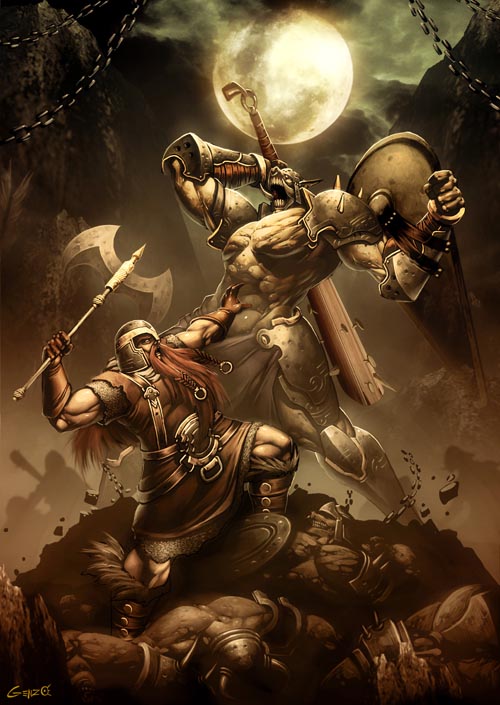
The Highlords (The Ruling Dominion)
The Highlords are the leaders of dwarven society. This faction is lead by the Queen and
King, who control the clan’s Greatholding. After these two, the Highlady and Highlord that rule
each holdfast also join as immensely powerful figures in this group. Furthermore, the rulers of
the numerous clan holdings, as well as diplomatic emissaries, advisors and counselors fill out
this faction to make it the most powerful in the clan.
All other factions are loyal to the rulers of the clan and are bound to them by generations of
blood oaths and centuries of tradition. While this group controls the laws and designs of the
clan, the average dwarf interacts with the decisions of this faction only in a indirect manner.
The Priesthood (The Holy Dominion)
The Priesthood is the guardian of the clan’s ancestors, the clan’s traditions and the clan’s
treasures. As such, the priesthood has tremendous power and influence. The bishops and deans
that make up upper echelons of this dominion are clerics of immense personal and political
power. Not only do they serve as religious leaders for the generally devout dwarven clans but
they also serve as official advisors to the Ruling Dominion. Furthermore, the
widowed priestesses that maintain contact with the ancestors of the clan, as well as the
Champions, the warrior-priests that guard the clan’s treasures and honor, both make up
significant elements of this faction.
Dwarven priests are organized in a hierarchical structure of orders.
The Military (The Iron Dominion)
The Iron Dominion is the proud and mighty defenders of the clan. They have a reputation
for being particularly surly and are probably the least friendly of the dwarves. Loyalty between
subject and liege in the Iron Dominion tends to be the strongest form of loyalty seen in dwarven
society. All of the dwarven tendency towards honor and obligation is massively strengthened
when dwarves put their lives in each-others' hands.
Most of the Iron Dominion is organized into armies. The armies vary tremendously in size,
with armies of under a hundred dwarves defending a clan holding and armies of over a thousand
serving as the personal protectors of the Queen and King. When war threatens, it is common for
many of the smaller armies to gather around one of the larger armies to face the threat. Lastly,
since the men of the clan are frequently involved in offensive action while the women of the clan
tend towards its defense, the gender bias of any particular army is often quite strong even if the
dominion as a whole has a reasonable gender balance.
In addition to the armies, the noble dwarves, along with some especially honorable clansman,
are organized into orders of knights.
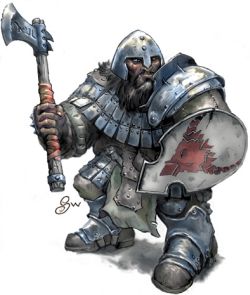
The Guilds (The Dominion of Gold)
The guilds are, at once, the largest and least powerful dominion. Although approximately eighty percent of the dwarven population of a typical clan belong to the Dominion of Gold, they are divided into a large number of small guilds each specializing in a particular activity. The activities that call for the existence of a guild are as diverse as the dwarves that practice them.
However, the organization of these guilds varies considerably from clan to clan.
Although they retain considerable importance since they care for much of the population, they are kept dispersed by the Highlords in order to prevent any guild from having the power to cut off food production for the clan.
Because of this organization, the food-producing guilds tend to work very closely with the lord of
their clan holding. This tends to work quite well, since many of the food producers own their
land while a large number farm areas controlled by their liege.
The internal organization of the guilds resembles a large fraternal society more than a business. At the center of the guild are the guildmasters who serve a number of leadership functions both practical and ceremonial. Around the guildmasters are the guildsmen, the full members (sometimes referred to as Brothers and Sisters) who have the right to own their own businesses. Below the guildsmen are the journeymen, partial members, some of whom have the ability to advance and others who have reached the peak of their career. After the journeymen are the apprentices, who hope to advance to become journeymen or full guildsmen after many
years of hard work and training. Lowest in the Dominion of Gold are the bondsmen. These dwarves share an oath of commitment between them and the guild.
On their part, they perform many of the more menial tasks that the guilds require. In return, the guild insures that their bondsmen are fed and housed to the extent they are able and, for each generation that the bond
lasts, the next generation receives a higher chance at receiving one of the coverted apprenticeships.
Naturally, the proportion of bondsmen to guildsmen varies greatly from guild to guild and, in some guilds, the bondsmen have the opportunity to develop skills of their own which, if carefully practiced and taught to their children can help speed up the process of advancement.

Dwarven society is complicated at best. All dwarves have numerous connections to their
society. Every dwarf is a member of a clan, the largest social group. To humans, a clan seems
like a cross between a nation and an extended family. However, to dwarves, it also represents
the strongest bonds of honor, mutual history and fanatical devotion.
Every dwarf is also a member of one of the four dominions. A dwarf’s dominion determines
the dwarf’s occupation and position in society. They are described in detail below.
A dwarf is also part of a caste. Caste is determined by birth and is determined by the nobility
of a dwarf’s bloodline.

The Dominions
There are four major groups (called dominions) that hold significant power in the typical
dwarven clan. Each of these groups has its own areas of influence and dominates dwarven
society in that area. Although the Highlords are, unquestionably, the most powerful of the
dominions in just about any clan, each has enough power to make the interplay between the
dominions the dominant force in dwarven politics.
Every dwarf has his or her own place in the dominion hierarchy. Ancestry plays a significant
role in the place that a dwarf has in the dominions. The child of a warrior will receive
preferential treatment by the Iron Dominion and a descendant of ten generations of warriors is
assured of an opportunity to achieve a prominent position. However, although ancestry opens
doors to a dominion, it is still necessary to walk through them. Ten generations of priestly
ancestors are necessary for a chance to become a leader, but only a powerful priest will
ever achieve that position. Lastly, although one who possesses only a moderate degree of skill or
potential will be barred from a position if the dwarf has insufficient ancestral claim, the truly
gifted will usually be granted a position.
One’s position or place has a great effect on the life of a dwarf. It not only determines the
respect that others grant you but it also is the basis of your life’s work. Priests need places in the
Holy Dominion to work their prayers. A weaponsmith needs a guildship to practice his art, and a
warrior needs a commission to lead others into battle. Lastly, each dominion has its own
individual code of honor that defines both how members should conduct themselves and how
they relate to members of other dominions. Although no dwarf is required to actually take these
honor codes as disadvantages, any dwarven player should carefully read what is considered
honorable for one in their position.

The Highlords (The Ruling Dominion)
The Highlords are the leaders of dwarven society. This faction is lead by the Queen and
King, who control the clan’s Greatholding. After these two, the Highlady and Highlord that rule
each holdfast also join as immensely powerful figures in this group. Furthermore, the rulers of
the numerous clan holdings, as well as diplomatic emissaries, advisors and counselors fill out
this faction to make it the most powerful in the clan.
All other factions are loyal to the rulers of the clan and are bound to them by generations of
blood oaths and centuries of tradition. While this group controls the laws and designs of the
clan, the average dwarf interacts with the decisions of this faction only in a indirect manner.
The Priesthood (The Holy Dominion)
The Priesthood is the guardian of the clan’s ancestors, the clan’s traditions and the clan’s
treasures. As such, the priesthood has tremendous power and influence. The bishops and deans
that make up upper echelons of this dominion are clerics of immense personal and political
power. Not only do they serve as religious leaders for the generally devout dwarven clans but
they also serve as official advisors to the Ruling Dominion. Furthermore, the
widowed priestesses that maintain contact with the ancestors of the clan, as well as the
Champions, the warrior-priests that guard the clan’s treasures and honor, both make up
significant elements of this faction.
Dwarven priests are organized in a hierarchical structure of orders.
The Military (The Iron Dominion)
The Iron Dominion is the proud and mighty defenders of the clan. They have a reputation
for being particularly surly and are probably the least friendly of the dwarves. Loyalty between
subject and liege in the Iron Dominion tends to be the strongest form of loyalty seen in dwarven
society. All of the dwarven tendency towards honor and obligation is massively strengthened
when dwarves put their lives in each-others' hands.
Most of the Iron Dominion is organized into armies. The armies vary tremendously in size,
with armies of under a hundred dwarves defending a clan holding and armies of over a thousand
serving as the personal protectors of the Queen and King. When war threatens, it is common for
many of the smaller armies to gather around one of the larger armies to face the threat. Lastly,
since the men of the clan are frequently involved in offensive action while the women of the clan
tend towards its defense, the gender bias of any particular army is often quite strong even if the
dominion as a whole has a reasonable gender balance.
In addition to the armies, the noble dwarves, along with some especially honorable clansman,
are organized into orders of knights.

The Guilds (The Dominion of Gold)
The guilds are, at once, the largest and least powerful dominion. Although approximately eighty percent of the dwarven population of a typical clan belong to the Dominion of Gold, they are divided into a large number of small guilds each specializing in a particular activity. The activities that call for the existence of a guild are as diverse as the dwarves that practice them.
However, the organization of these guilds varies considerably from clan to clan.
Although they retain considerable importance since they care for much of the population, they are kept dispersed by the Highlords in order to prevent any guild from having the power to cut off food production for the clan.
Because of this organization, the food-producing guilds tend to work very closely with the lord of
their clan holding. This tends to work quite well, since many of the food producers own their
land while a large number farm areas controlled by their liege.
The internal organization of the guilds resembles a large fraternal society more than a business. At the center of the guild are the guildmasters who serve a number of leadership functions both practical and ceremonial. Around the guildmasters are the guildsmen, the full members (sometimes referred to as Brothers and Sisters) who have the right to own their own businesses. Below the guildsmen are the journeymen, partial members, some of whom have the ability to advance and others who have reached the peak of their career. After the journeymen are the apprentices, who hope to advance to become journeymen or full guildsmen after many
years of hard work and training. Lowest in the Dominion of Gold are the bondsmen. These dwarves share an oath of commitment between them and the guild.
On their part, they perform many of the more menial tasks that the guilds require. In return, the guild insures that their bondsmen are fed and housed to the extent they are able and, for each generation that the bond
lasts, the next generation receives a higher chance at receiving one of the coverted apprenticeships.
Naturally, the proportion of bondsmen to guildsmen varies greatly from guild to guild and, in some guilds, the bondsmen have the opportunity to develop skills of their own which, if carefully practiced and taught to their children can help speed up the process of advancement.

 Re: How to roleplay a dwarf : General guide
Re: How to roleplay a dwarf : General guide
The Caste System
There are five well-defined levels of status within dwarven society: Royalty, Nobility,
Clansmen, Outsiders and Outcasts.
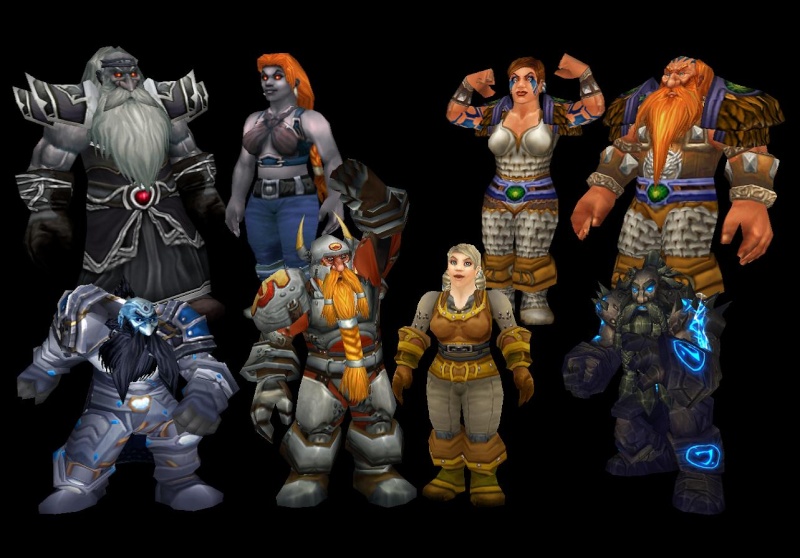
Royalty
Although Royalty are technically the members of the ruling houses of each clan, the size of
these houses can be quite large. Most royal houses have over three thousand members, where
only a few hundred or so are actually in line to the throne. Members of the royal house serve
numerous important tasks throughout the clan. Princesses and Princes serve as high priests,
generals, guildmasters and just about any other honorable position. Many younger Princes and
Princesses have difficulty since their family can not support their desired profession, and thus
these young royals serve as ambassadors and assistants to more important relatives.
Although all of the lesser royalty technically hold the title of "Princess" or "Prince", most go
by the more generic title of "Lord" or "Lady" in all but the most official ceremonies. Those who
are actually in line to the throne are referred to as "High Princess" or "High Prince" unless they
are the direct children of the current Queen or King in which case they are referred to as "Most
High Princess" or "Most High Prince". Naturally the actual heir is referred to as "Highest
Princess" or "Highest Prince".
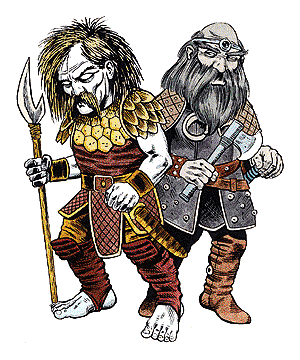
Nobility
The dwarven nobility is roughly made up of a number of houses that were important prior to
being absorbed into the clans. Over time, some noble houses have risen from great deeds and
some have fallen. However, as dwarves have long memories of past great deeds and are not
easily impressed, the longevity of dwarven noble houses draws considerable respect and some
envy from their human equivalents. The leaders and important members of noble houses are
"Lords" and "Ladies". The lesser members are considered generically to be "nobles" and are
referred to as "Master" or "Mistress" unless they posses a title of their own, in which case they
are probably referred to as "Sir" or "Dame". Fortunately for ignorant outsiders, dwarves, while
extremely concerned about honor and ceremony, take some pleasure in the idea that humans have
difficulty understanding it all. For this reason, most dwarven nobles take great pleasure in
explaining to a willing listener exactly how they should be referred to. So long as the outsider is
polite, gives the noble the benefit of the doubt, and makes a reasonable attempt to address him or
her correctly, the outsider is usually granted considerably patience and leeway.
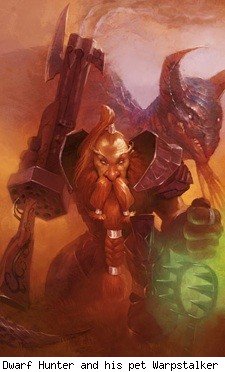
Clansmen
Clansmen make up the vast bulk of the clan.
Outsiders
These are people outside the clan. This includes dwarves from other clans, humans and any other civilized beings worthy of dwarven respect.
Outcasts
These are the people that have been thrown out of the clan, usually for reasons of dishonor,
and are not allowed to return. Outcasts are not likely to be accepted at holds of other clans, since
the other clans have no more desire to permit a dishonorable dwarf among them. Most outcasts
wander unoccupied caves, scraping out a living, or (if they can conquer their agoraphobia) they
make seek welfare on the surface.
Outcasts are not chased or hunted, but are not permitted to be in the same space as true clansman.
Outcasts are generally pitied, since they cannot join with their clan's ancestors after death.
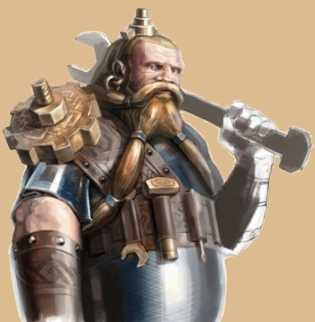
Titles
In dwarven society the structure of titles is quite complicated. Any given dwarf can have a
long series of titles and may go by different titles in different situations. For this reason, it is
considered the responsibility of a dwarf and his friends to communicate the proper title to others.
Dwarves fully expect their titles to be mangled frequently and, in fact, consider it quite a
complement when members of other races address them correctly.
It would be impossible to write down the full extent of dwarven titles in this document. (In
fact, an entire book could be devoted to the subject.)
There are five well-defined levels of status within dwarven society: Royalty, Nobility,
Clansmen, Outsiders and Outcasts.

Royalty
Although Royalty are technically the members of the ruling houses of each clan, the size of
these houses can be quite large. Most royal houses have over three thousand members, where
only a few hundred or so are actually in line to the throne. Members of the royal house serve
numerous important tasks throughout the clan. Princesses and Princes serve as high priests,
generals, guildmasters and just about any other honorable position. Many younger Princes and
Princesses have difficulty since their family can not support their desired profession, and thus
these young royals serve as ambassadors and assistants to more important relatives.
Although all of the lesser royalty technically hold the title of "Princess" or "Prince", most go
by the more generic title of "Lord" or "Lady" in all but the most official ceremonies. Those who
are actually in line to the throne are referred to as "High Princess" or "High Prince" unless they
are the direct children of the current Queen or King in which case they are referred to as "Most
High Princess" or "Most High Prince". Naturally the actual heir is referred to as "Highest
Princess" or "Highest Prince".

Nobility
The dwarven nobility is roughly made up of a number of houses that were important prior to
being absorbed into the clans. Over time, some noble houses have risen from great deeds and
some have fallen. However, as dwarves have long memories of past great deeds and are not
easily impressed, the longevity of dwarven noble houses draws considerable respect and some
envy from their human equivalents. The leaders and important members of noble houses are
"Lords" and "Ladies". The lesser members are considered generically to be "nobles" and are
referred to as "Master" or "Mistress" unless they posses a title of their own, in which case they
are probably referred to as "Sir" or "Dame". Fortunately for ignorant outsiders, dwarves, while
extremely concerned about honor and ceremony, take some pleasure in the idea that humans have
difficulty understanding it all. For this reason, most dwarven nobles take great pleasure in
explaining to a willing listener exactly how they should be referred to. So long as the outsider is
polite, gives the noble the benefit of the doubt, and makes a reasonable attempt to address him or
her correctly, the outsider is usually granted considerably patience and leeway.

Clansmen
Clansmen make up the vast bulk of the clan.
Outsiders
These are people outside the clan. This includes dwarves from other clans, humans and any other civilized beings worthy of dwarven respect.
Outcasts
These are the people that have been thrown out of the clan, usually for reasons of dishonor,
and are not allowed to return. Outcasts are not likely to be accepted at holds of other clans, since
the other clans have no more desire to permit a dishonorable dwarf among them. Most outcasts
wander unoccupied caves, scraping out a living, or (if they can conquer their agoraphobia) they
make seek welfare on the surface.
Outcasts are not chased or hunted, but are not permitted to be in the same space as true clansman.
Outcasts are generally pitied, since they cannot join with their clan's ancestors after death.

Titles
In dwarven society the structure of titles is quite complicated. Any given dwarf can have a
long series of titles and may go by different titles in different situations. For this reason, it is
considered the responsibility of a dwarf and his friends to communicate the proper title to others.
Dwarves fully expect their titles to be mangled frequently and, in fact, consider it quite a
complement when members of other races address them correctly.
It would be impossible to write down the full extent of dwarven titles in this document. (In
fact, an entire book could be devoted to the subject.)
 Re: How to roleplay a dwarf : General guide
Re: How to roleplay a dwarf : General guide
Dwarven Relations with Other Races
(see their honor codes too)
Humans
Humans are a mixed lot. Some are as honorable as a dwarven warrior. Others are as
loathsome as a rat in a sewer. Generally, they have a poor sense of history and a terrible sense of
tradition. Nonetheless, many humans are worthwhile and they are certainly not worth damning as a
group. You just need to be careful with them. Keep on your guard until you are sure you have one
of the good ones. They will never be the same as a clansman but it would be unfair to expect them
to be.
Orcs
Orcs are a plague on all our clans. They are not very dangerous by themselves but they
always come in groups of hundreds. If you get one by itself, kill it before it can join with more of
them. Mostly, you can just wait behind your fortress and let the orcs throw themselves upon your
walls and traps. However, from time to time they get a smart leader and you need to go on the
offensive.
The Warrior Tradition: Defending the Clan
The defense of the clan is the first and foremost concern of the Iron Dominion and is
seriously considered by just about every dwarf in the clan. All dwarves are taught some level of
combat as a child, and many dwarves are proficient in the art of weaponsmithing. Within the
Iron Dominion, the female knights and lords generally take responsibility for the defense of the
clan. Dwarven women are generally considered to be more diligent and reliable than dwarven
men and are responsible for maintaining the clan’s health and safety.
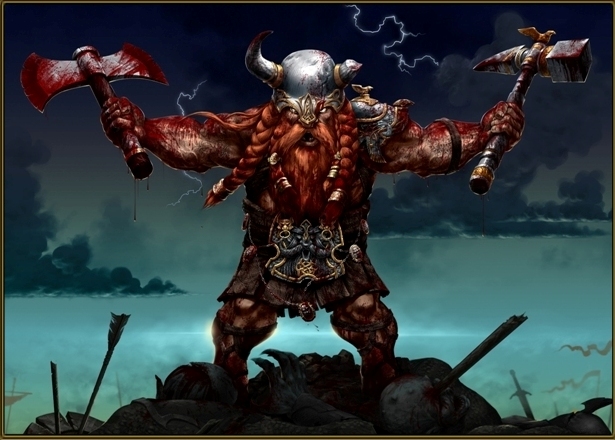
Dwarven trade goods:
Dwarven Whiskey
Unfortunately, the high toxicity of Dwarven Whiskey has driven most trade in this substance
underground (no pun intended) among the surface races. While dwarves can become quite drunk
off the beverage, humans tend to respond to it by either passing out, going into a coma or simply
dying on the spot. Fortunately for humans not possessed of dwarven gullets, the bright green color and pungent aroma makes it difficult to mistake dwarven whiskey for the human equivalent.
Lizard Jerky
What this leathery substance loses in taste when compared to the beef equivalent, it more
than makes up in longevity. It loses a lot in taste. Legend tells of a dwarven explorer from
Icemountain who survived by eating his own leather armor that he had cleverly made almost
completely from the jerky. Sailors on long expeditions swear by it. They also swear at it, and
about it, so one can't quite tell their true opinions on the subject.
Dwarven Lagers & Ales
Dwarves drink these like they were water and are completely unaffected by the alcohol.
Humans drink these like they were gin and vodka and are completely affected by the substantial
alcohol content. In northern Cadfaigh, the priests of Dorial are stout supporters (pun intended)
of trade with Clan Wyrmsbane so they could get access to these products.
Dwarven Stouts
While dwarves can actually become intoxicated by these brews, several human connoisseurs
describe Dwarven Stout as "Dirty Grain Alcohol". Dwarves believe that humans are simply
incapable of stomaching the 8- to 20-year old distilled drink. They are generally correct in this
belief.
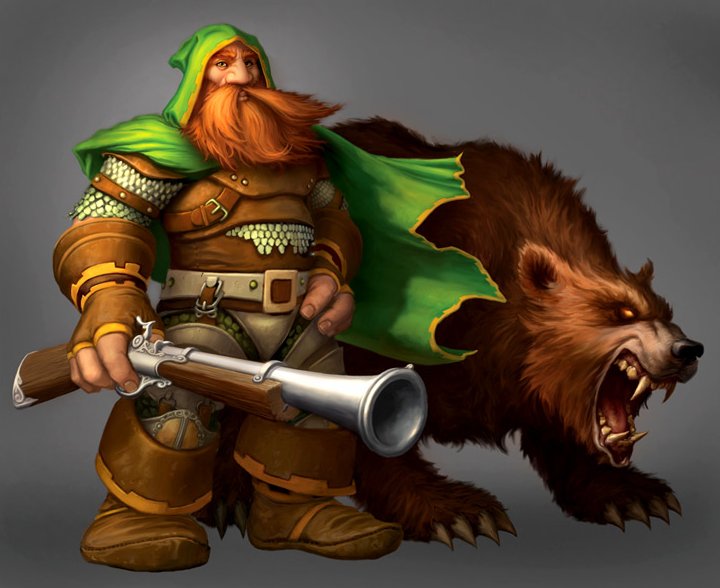
Dwarven Slang
Oaths are very important to dwarves. In additional to swearing loyalty to their clan and their
liege, your average dwarf will swear at just about anything. Travelers who have visited a place with dwarves have said that “swearing like a dwarf” is very much like “swearing like a sailor.” The only difference is that it takes longer to swear like a dwarf and you are much more likely to touch on the subject of orcs. Insulting a dwarf you don’t know is likely to get you into a lot of trouble. Dwarves can be very quick to anger when their honor or ancestry is questioned but will generally forgive insults about themselves fairly quickly. Insulting a dwarf’s liege is a very bad idea, which means that insulting a liege when vassals are around is an easy way to get killed.
“Orc Shit!”
This is pretty self-explanatory. Dwarves use this as an expression of disbelief or disgust.
“Oathbreaker”
Oathbreaker is an extremely serious insult. However, it is sufficiently unbelievable that, it
can be used affectionately in the right context. Good friends could call each other oathbreakers
and treat it lightly. Calling a strange dwarf an oathbreaker is an excellent way to get badly
injured. (Compare to the human term "motherfucker": it is rarely used to actually indicate
sleeping with one's mother; among friends it can be used as rough affection; with strangers it is
dangerous.)
Giving someone the lizard
This isn’t a phrase as much as a facial expression. It consists of flicking your tongue off
your front teeth at the person you want to insult. This is considered extremely rude. The exact
meaning of this expression varies considerably from clan to clan and in some cases, from city to city.
A venturesome scholar did some research into the exact meaning of this gesture. According to several sources it means “Your ancestors liked orcs.”

Class Choices
Warrior:
A very good option for dwarves. Dwarves love weapons, almost any kind of weapon. Dwarves also love to go to the field themselves and fight melee. Though a lot of dwarves like guns over the weapons, a sharpshooters best friend, a dwarf warrior has many options, he could basicly be anything a dwarf would want! (Nothing magical) An explorer, adventurer, soldier, or mercenary... If you are good enough, maybe you will even be able to make your dwarf a Dwarven Avatar!
Hunter:
Dwarves love guns as you know, a hunter could be the perfect way to show it! Picking up engineering along may be able to even make your RP experience better! Hunters could make excellent sharpshooters. Bronzebeards are the Marksmen spec generally, as the sharpshooters from W3 were Bronzebeard, and the Wildhammers will most likely be Beast Master because of their ties with nature.
Rogue:
Dwarves are honorable, rogue isn't really the first choice to pick, considering they are very muscular too, it dosen't fit very well to RP. But your Dwarf could be the criminal guy who never liked the battle front too much... Rather the battle's "back"... This is interesting. No accounts of Wildhammer rogues have been given, but there is a plethora of Dark Iron rogues. Bronzebeard rogues are seen less, but still seen. All in all, it isn’t a bad thing to pick, but it isn’t exactly popular. They could be played as a fighter who likes the maneuverability of leather armor and one handed weapons, or a thief, both have been seen.
Priest:
This might be a tricky one. Dwarves are not traditionally associated with magic, and would rather wield a hammer than preach about their religion. Since humans taught the dwarves the way of the Light, they could become paladins, and some chose to go the second way and become priests.
There are a few Wildhammer priests, but the vast majority are Bronzebeard. There generally aren’t too many priests, but it isn’t the “odd’ thing to do. Priests have become much more prevalent in dwarven culture. This is a valid choice. There don't appear to be any Wildhammer or Dark Iron priests at all, but there could be some living under the radar.
Paladin:
Great Choice for a dwarf! Honorable, kind, loving, fights to protect. The Paladin shows the kindness in the dwarves heart combined with their battle skills. It was the humans who taught the dwarves the way of Light. There are dwarven Paladins, all Bronzebeard. Because of their believing in the Holy Light, but also their views on martial prowess, Paladin becomes a perfect choice for many dwarves.
Mage (Cataclysm):
A Dwarf mage is basically a bit unusual, because dwarves do not like magical "tricks". They could be a runemaster like the Earthen, unleashing powers from runes written on simple papers to unleash devastating power does sound very fun and interesting. The Dark Iron dwarves were always interested in magic, and in Cataclysm, the Dark Iron dwarves came back to Ironforge and formed The Three Hammers again, the Dark Iron dwarves taught the Bronzebeard dwarves the way of arcane magic.
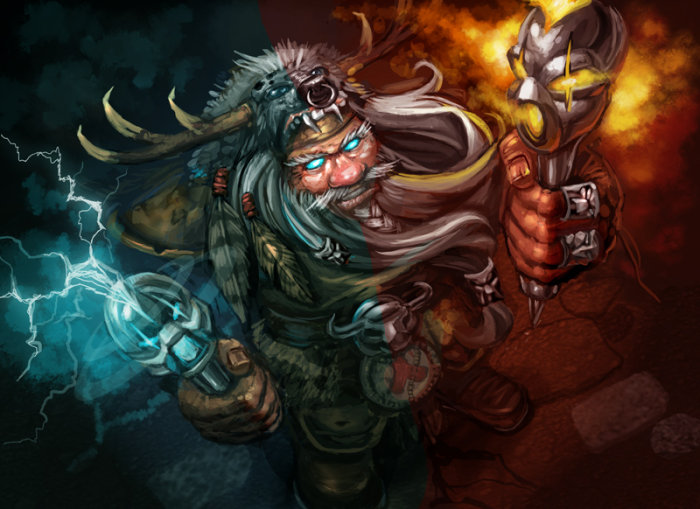
Shaman (Cataclysm):
Following King Magni's heroic scrafice for the elements so they would protect Ironforge from the Catastrophic Cataclysm, dwarves started to look into shamanism and understanding the elements. The Wildhammer dwarves were practicing shamanism too, it may be very interesting to roleplay a dwarven shaman. Remember, dwarves dig deep in the earth, which is against the elements; a bit of a conflict between them and the Explorers' League could add a bit more spice to the Alliance. But remember, dwarves were once the Earthen, which makes them pretty close to shamanism.
Bronzebeard dwarves can now train to be shamans, most likely from the increased association with the Wildhammer clan. This can be useful for cross clan rp.
Warlock (Cataclysm):
Dwarf warlocks are pretty unusual around the Bronzebeard dwarves, but since some of the Dark Iron dwarves have joined them they could have learned dark magic from them. Warlocks are more welcome to Ironforge than they are to Stormwind, but a warlock wouldn't show what they really are in public and would often hide themselves.
Remember, Dwarves prefer guns and axes over magic, though there are always different playing styles! Explore each class to decide how to make your dwarf special!
Dwarfen Professions
Craftguilds are a major part of life within a Dwarf-hold. Each clan belongs to a different craftguild and almost all members of that clan follow their mother to join that craftguild. For example, the Grudgestone founder Duregar was a jeweler and thus all Grudgestones (except for those who receive special permission from the clan Matriarch) are also members of the jewelers guild.
While they are young, Dwarfs are trained in the basics of mining and metalwork and may also learn several other skills outside their craftguild. However, once they reach the age of Young Clan Member, they focus mostly on their particular craft.
Craft is very important to Dwarfs. Their marriage ritual is entirely reliant on their crafting skills. Dwarfs also rank crafts in an unofficial hierarchy of prestige. At the top of this ranking are goldsmiths, jewelers and engineers.
Brewer's Craftguild
An extremely important and well-respected craftguild in all Dwarf holds is that of the Brewers. They have the task of brewing up all the beer, mead, and ale within a Dwarf hold. This is a vital store of supply, since Dwarf beer is very nourishing and can even be used to stave off starvation during a long siege. It is frequently said that the measure of a Dwarf hold in how long it can withstand a siege is the quality of its Brewer's Guild.
(see their honor codes too)
Humans
Humans are a mixed lot. Some are as honorable as a dwarven warrior. Others are as
loathsome as a rat in a sewer. Generally, they have a poor sense of history and a terrible sense of
tradition. Nonetheless, many humans are worthwhile and they are certainly not worth damning as a
group. You just need to be careful with them. Keep on your guard until you are sure you have one
of the good ones. They will never be the same as a clansman but it would be unfair to expect them
to be.
Orcs
Orcs are a plague on all our clans. They are not very dangerous by themselves but they
always come in groups of hundreds. If you get one by itself, kill it before it can join with more of
them. Mostly, you can just wait behind your fortress and let the orcs throw themselves upon your
walls and traps. However, from time to time they get a smart leader and you need to go on the
offensive.
The Warrior Tradition: Defending the Clan
The defense of the clan is the first and foremost concern of the Iron Dominion and is
seriously considered by just about every dwarf in the clan. All dwarves are taught some level of
combat as a child, and many dwarves are proficient in the art of weaponsmithing. Within the
Iron Dominion, the female knights and lords generally take responsibility for the defense of the
clan. Dwarven women are generally considered to be more diligent and reliable than dwarven
men and are responsible for maintaining the clan’s health and safety.

Dwarven trade goods:
Dwarven Whiskey
Unfortunately, the high toxicity of Dwarven Whiskey has driven most trade in this substance
underground (no pun intended) among the surface races. While dwarves can become quite drunk
off the beverage, humans tend to respond to it by either passing out, going into a coma or simply
dying on the spot. Fortunately for humans not possessed of dwarven gullets, the bright green color and pungent aroma makes it difficult to mistake dwarven whiskey for the human equivalent.
Lizard Jerky
What this leathery substance loses in taste when compared to the beef equivalent, it more
than makes up in longevity. It loses a lot in taste. Legend tells of a dwarven explorer from
Icemountain who survived by eating his own leather armor that he had cleverly made almost
completely from the jerky. Sailors on long expeditions swear by it. They also swear at it, and
about it, so one can't quite tell their true opinions on the subject.
Dwarven Lagers & Ales
Dwarves drink these like they were water and are completely unaffected by the alcohol.
Humans drink these like they were gin and vodka and are completely affected by the substantial
alcohol content. In northern Cadfaigh, the priests of Dorial are stout supporters (pun intended)
of trade with Clan Wyrmsbane so they could get access to these products.
Dwarven Stouts
While dwarves can actually become intoxicated by these brews, several human connoisseurs
describe Dwarven Stout as "Dirty Grain Alcohol". Dwarves believe that humans are simply
incapable of stomaching the 8- to 20-year old distilled drink. They are generally correct in this
belief.

Dwarven Slang
Oaths are very important to dwarves. In additional to swearing loyalty to their clan and their
liege, your average dwarf will swear at just about anything. Travelers who have visited a place with dwarves have said that “swearing like a dwarf” is very much like “swearing like a sailor.” The only difference is that it takes longer to swear like a dwarf and you are much more likely to touch on the subject of orcs. Insulting a dwarf you don’t know is likely to get you into a lot of trouble. Dwarves can be very quick to anger when their honor or ancestry is questioned but will generally forgive insults about themselves fairly quickly. Insulting a dwarf’s liege is a very bad idea, which means that insulting a liege when vassals are around is an easy way to get killed.
“Orc Shit!”
This is pretty self-explanatory. Dwarves use this as an expression of disbelief or disgust.
“Oathbreaker”
Oathbreaker is an extremely serious insult. However, it is sufficiently unbelievable that, it
can be used affectionately in the right context. Good friends could call each other oathbreakers
and treat it lightly. Calling a strange dwarf an oathbreaker is an excellent way to get badly
injured. (Compare to the human term "motherfucker": it is rarely used to actually indicate
sleeping with one's mother; among friends it can be used as rough affection; with strangers it is
dangerous.)
Giving someone the lizard
This isn’t a phrase as much as a facial expression. It consists of flicking your tongue off
your front teeth at the person you want to insult. This is considered extremely rude. The exact
meaning of this expression varies considerably from clan to clan and in some cases, from city to city.
A venturesome scholar did some research into the exact meaning of this gesture. According to several sources it means “Your ancestors liked orcs.”

Class Choices
Warrior:
A very good option for dwarves. Dwarves love weapons, almost any kind of weapon. Dwarves also love to go to the field themselves and fight melee. Though a lot of dwarves like guns over the weapons, a sharpshooters best friend, a dwarf warrior has many options, he could basicly be anything a dwarf would want! (Nothing magical) An explorer, adventurer, soldier, or mercenary... If you are good enough, maybe you will even be able to make your dwarf a Dwarven Avatar!
Hunter:
Dwarves love guns as you know, a hunter could be the perfect way to show it! Picking up engineering along may be able to even make your RP experience better! Hunters could make excellent sharpshooters. Bronzebeards are the Marksmen spec generally, as the sharpshooters from W3 were Bronzebeard, and the Wildhammers will most likely be Beast Master because of their ties with nature.
Rogue:
Dwarves are honorable, rogue isn't really the first choice to pick, considering they are very muscular too, it dosen't fit very well to RP. But your Dwarf could be the criminal guy who never liked the battle front too much... Rather the battle's "back"... This is interesting. No accounts of Wildhammer rogues have been given, but there is a plethora of Dark Iron rogues. Bronzebeard rogues are seen less, but still seen. All in all, it isn’t a bad thing to pick, but it isn’t exactly popular. They could be played as a fighter who likes the maneuverability of leather armor and one handed weapons, or a thief, both have been seen.
Priest:
This might be a tricky one. Dwarves are not traditionally associated with magic, and would rather wield a hammer than preach about their religion. Since humans taught the dwarves the way of the Light, they could become paladins, and some chose to go the second way and become priests.
There are a few Wildhammer priests, but the vast majority are Bronzebeard. There generally aren’t too many priests, but it isn’t the “odd’ thing to do. Priests have become much more prevalent in dwarven culture. This is a valid choice. There don't appear to be any Wildhammer or Dark Iron priests at all, but there could be some living under the radar.
Paladin:
Great Choice for a dwarf! Honorable, kind, loving, fights to protect. The Paladin shows the kindness in the dwarves heart combined with their battle skills. It was the humans who taught the dwarves the way of Light. There are dwarven Paladins, all Bronzebeard. Because of their believing in the Holy Light, but also their views on martial prowess, Paladin becomes a perfect choice for many dwarves.
Mage (Cataclysm):
A Dwarf mage is basically a bit unusual, because dwarves do not like magical "tricks". They could be a runemaster like the Earthen, unleashing powers from runes written on simple papers to unleash devastating power does sound very fun and interesting. The Dark Iron dwarves were always interested in magic, and in Cataclysm, the Dark Iron dwarves came back to Ironforge and formed The Three Hammers again, the Dark Iron dwarves taught the Bronzebeard dwarves the way of arcane magic.

Shaman (Cataclysm):
Following King Magni's heroic scrafice for the elements so they would protect Ironforge from the Catastrophic Cataclysm, dwarves started to look into shamanism and understanding the elements. The Wildhammer dwarves were practicing shamanism too, it may be very interesting to roleplay a dwarven shaman. Remember, dwarves dig deep in the earth, which is against the elements; a bit of a conflict between them and the Explorers' League could add a bit more spice to the Alliance. But remember, dwarves were once the Earthen, which makes them pretty close to shamanism.
Bronzebeard dwarves can now train to be shamans, most likely from the increased association with the Wildhammer clan. This can be useful for cross clan rp.
Warlock (Cataclysm):
Dwarf warlocks are pretty unusual around the Bronzebeard dwarves, but since some of the Dark Iron dwarves have joined them they could have learned dark magic from them. Warlocks are more welcome to Ironforge than they are to Stormwind, but a warlock wouldn't show what they really are in public and would often hide themselves.
Remember, Dwarves prefer guns and axes over magic, though there are always different playing styles! Explore each class to decide how to make your dwarf special!
Dwarfen Professions
Craftguilds are a major part of life within a Dwarf-hold. Each clan belongs to a different craftguild and almost all members of that clan follow their mother to join that craftguild. For example, the Grudgestone founder Duregar was a jeweler and thus all Grudgestones (except for those who receive special permission from the clan Matriarch) are also members of the jewelers guild.
While they are young, Dwarfs are trained in the basics of mining and metalwork and may also learn several other skills outside their craftguild. However, once they reach the age of Young Clan Member, they focus mostly on their particular craft.
Craft is very important to Dwarfs. Their marriage ritual is entirely reliant on their crafting skills. Dwarfs also rank crafts in an unofficial hierarchy of prestige. At the top of this ranking are goldsmiths, jewelers and engineers.
Brewer's Craftguild
An extremely important and well-respected craftguild in all Dwarf holds is that of the Brewers. They have the task of brewing up all the beer, mead, and ale within a Dwarf hold. This is a vital store of supply, since Dwarf beer is very nourishing and can even be used to stave off starvation during a long siege. It is frequently said that the measure of a Dwarf hold in how long it can withstand a siege is the quality of its Brewer's Guild.
 Re: How to roleplay a dwarf : General guide
Re: How to roleplay a dwarf : General guide
Dwarfen Temperament
Dwarfs are by nature consummate craftsmen. Since the dawn of their people, they've always valued hard work and diligence. A common Dwarfen phrase is "Gold can be stolen, honor can be lost, but skill once obtained is eternal." This has led them to a conservative worldview as far as making things is concerned. Time-tried methods (and the time involved is usually centuries) are always used. New innovations take decades or more to take root.
Dwarfs also value age. History is a major part of Dwarfen culture, and age belies history. Their favorite weapons are usually centuries old, which is the mark of good craftsmanship. Unlike a manling cannon, for example, which will probably be replaced within the lifetime of the men crewing it, a Dwarfen cannon isn't even considered battle-ready until it has survived at least one hundred years of use.
Additionally, a Dwarf's word is his bond. Dwarfs are sometimes seen as evasive by outsiders because a Dwarf will never ever give his word to do a deed that he cannot or doesn't think he will be able to complete. The reason for this is the shame associated with failing his oath (which is what all Dwarf promises are, be they great or small) is so great that the Dwarf who did so would have to shave his head, leave his clan, and become a Slayer seeking death in the dark places of the Old World.
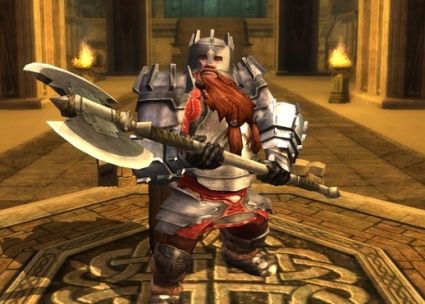
Names, names, names
All dwarves have three or four parts to their name. The first part of their name is the title.
Most dwarves have the title of Clansman or Clanswoman but nobles, knights, members of the
royal house and anyone else with a particularly important position will have a different title.
The second and third parts of a dwarf’s name are the given and family names. The player
can, more or less, make these up. Family names are generally two English words stuck together
and are inherited from the mother.
The family name of a Princess or Prince is the same as the name of the clan.
Lastly, some dwarves have an epithet which they add to the end of their names. Granting
epithets to members of the royal or noble castes is the province of the highest levels of dwarven
society and receiving one is a great honor. A noble dwarf would only be granted an epithet after
either a lifetime of honorable service or having completed a great deed for the clan. Players
considering such an epithet should be sure to figure out what was done before adding it to their
character.
However, for clansman, epithets are bestowed more easily. Although such epithets are still
bestowed by the clansman’s liege, they can be a mark of fondness just as much as they are a
mark of honor. These epithets also tend to be characterized by physical traits such as “the Tall”
or “the Strong” while noble epithets are frequently more graphic and relate to the holder’s
honorable deeds (“the Mighty,” “the Holy” and “the Bloody” are examples).
Players of dwarven characters are encouraged to make up a genealogy. Although this is
rarely necessary to play a character, it can be quite nice to have if you are playing a noble. Given
names are based on the parent’s name of the same sex. Therefore, a male player can make up the
name of his character’s father by changing a few letters in his character’s name. A female player
can do the same for her character’s mother. When giving a genealogy, use the form “X, daughter
of Y, daughter of Z.” (Substitute “son of” if you are male.)
If you do this well, there will be a nice rhythm to the genealogy since all of the names sound similar.
Lastly, although nearly every dwarf has a name of this sort, common usage tends to be a
good deal less formal. Even noble dwarves frequently grant their friends and companions leave
to address them less formally in private.
Most often, Dwarven last names are a combination of noun/verb such as Hammerthrower, or noun/noun such as Bronzebeard. First names vary, but M’s and K’s are seen a lot. R’s and N’s are around too. While dwarves like alcohol, don’t name your dwarf Beerthrower or something like that. There are very few alcohol related dwarf names.
Dwarfen names are mostly drawn from Old Icelandic with the final "r" removed or softened for ease of pronunciation. For example my name is taken from the Old Icelandic Ormr. Conventionally, Icelandic names tend to have hard consonant clusters and end in r. However, when they are anglicized this r is usually dropped after a consonant.
Dwarfs usually have four names when they reach full maturity. These are the personal name (I am Ormir!) the Patronymic (based on your father's name -- I am Ormir Snorrisson!) the deed-name (given to you by compatriots or a master for some trait or deed, I haven't been given one yet) and the Clan Name which is whatever clan your MOTHER was from (I am Grudgestone!)
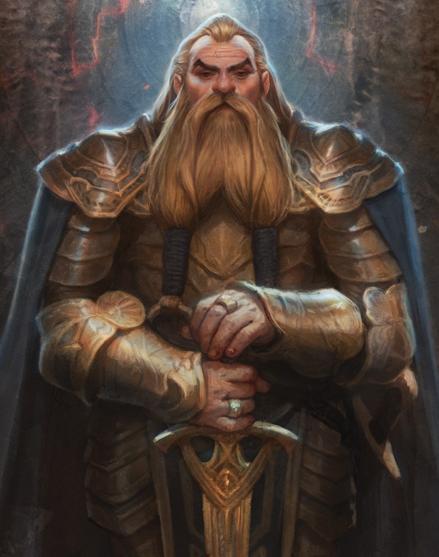
Faith
Bronzebeards generally worship the Holy Light (seeing as their only spellcasters in WoW are Priests/Paladins), however come Cataclysm they will have Shamans and Mages and possibly Warlocks, which shows that the Bronzebeards are open to most forms of Religion (seeing as how Druidism will be pretty much the only form of “worship” not seen.)
Wildhammers are Shamanistic, druidistic and some (but very very few) practice the Holy Light. They kind of take the role of the Night Elves and Tauren in the Eastern Kingdoms, bringing nature worship.
The Dark Irons have, until recently, and perhaps still, worshiped the Elemental Being Ragnaros as a god. Now that he has been banished, it remains to be seen what they are.

Things to remember
There are a few rules that a dwarf roleplayer must always consider:
Dwarves have their own accent that heavily resembles that of the Scottish accent. Calling men Lads, Women Lasses, You is ye, Your is Yer and much more.... (For more of an example try listening to the Dwarf NPCs, or some of your vocal emotes.)
Dwarves express anger by mentioning something short or long.
For Example, a dwarf tripped and his ale spilled out of his mug: "Oh By Magni's beard!"
Or something longer: "Oh By Muradin's second solid yet nimble axe!" Or just: "BLAST IT ALL TE HELL!"
Not much is known about Dwarven beliefs or religions, but some follow the light, some believe in the titans, some are shamanistic, etc... You can make your dwarf believe in something unique to make him special.
There are multiple clans of dwarves, each with their separate cultures. Wildhammer dwarves are less technologically advanced as their Ironforge cousins, and prefer shamanism over feats of engineering.
Wildhammer dwarves usually have darker skin as opposed to their Ironforge dwarves. Dark Iron dwarves are on the fringes of dwarven society, likely the least respected. They're far more likely to delve into secret and forbidden magic.
This guide explains only just the basic dwarven ideas, there is still much more to learn about dwarves. Try to ask friends, complete quests, and read about them in more articles to make your dwarf the best dwarf you can!
Your character will most likely be a Bronzebeard or a Wildhammer. I can imagine a Dark Iron mercenary, but I doubt any redeemed Dark Iron warrior turned shaman will work.
Keep in mind that while dwarves love their brew, it is generally not a crippling weakness (note: there are quite a few exceptions to this).
Your dwarf does not have to be a miner/blacksmith/explorer. While these are the largest professions, if your character does something else it won’t matter too much.
Dwarves aren’t known for tact. Get over it.
Dwarves are generally physically stronger than almost all Alliance races, and can be on par with Orcs for pure muscle, (size is another matter).
Your dwarf will most likely have an innate understanding of machinery to the point where s/he can drive most vehicles after a little training (although you can’t just make some random device out of nowhere).
Dwarf women aren’t known for their beauty. This does not mean there are no beautiful dwarf women.
There is a split between dwarves who travel and those who don’t. Generally, they like to stay in Khaz Modan, especially Dun Morogh. However, there are many dwarves who travel outside as Explorers. While a priest is unlikely to be an explorer (although traveling priest I guess…) your hunter probably will. It all depends on what you feel like.
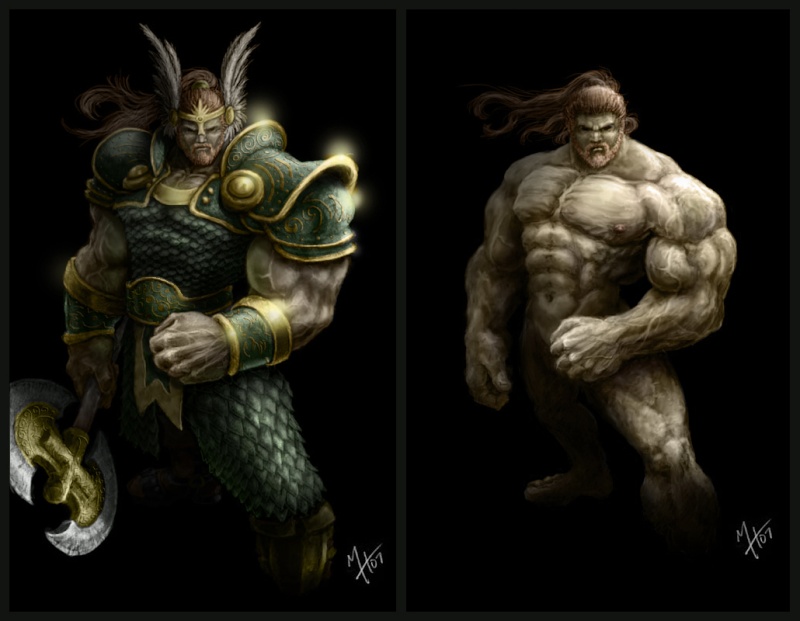
The Dwarven Accent
The Dwarven accent is basically a Scottish accent.
He points out a lot of the key pronunciation differences between Scottish and normal English. However the Dwarven accent itself is a more archaic form of Scottish English that still using some of the old English words like "ye" instead of "you" for instance.
For example:
"What are you doing?"
Becomes
"Whot er ye doin'?"
"What" becomes "Whot" because the Dwarven accent tends to have deeper sounding vowel.
Words like "dignity" might sounds more like "dug-ni-teh" coming from a dwarf. "Are" becomes "er" because its somewhat being added together with "What" to make a sound like "Water" when pronounced out loud. They also tend to shorten words that have "ing" sounds at the end. "Fighting" becomes Fightin' for example.
Words ending in "ly" are usually pronounced by a dwarf as "leh". So "happily" sounds like "happileh." You usually only need to do that if there is an "l" in front of the "y". Certain letters like "l" create extra syllables in the Scottish accent. So Dyin' would not be Dehin' for instance because the letter "d" unlike "l" does not create the extra syllable.
There are few word there you may or may not wish to add in that fit the accent well. Christine Golden uses these words often when she writes the Bronzebeard brothers in her Warcraft novels
Ken- know (EX: "I ken ye, lass.")
Bairn- A child of age just before puberty. (EX "A lot o' bairns in tha' orphanage there.")
Bony- Blonde or fair haired (EX: "Arthas, ye bony lad!")
There are mods you can use as well, but none of them are particularly great and I feel it personally takes away from your RP experience. It will take practice to get used to typing the accent and being able to stop typing it when you need to say something in your OOC channels.
The most important thing to remember though is: DO NOT GO OVERBOARD WITH IT! If you feel the meaning of your sentence is lost in your accent, you're doing it wrong.
Too often do I see
"Wot err ye dooin' i've g'ta g't som' 'elp o'er 'ere wit t'ese lads!"
The quality of your accent is not based on the amount of apostrophes you have in it, its the consistency of your accent that will garner attention.
"Whot er ye doin'? I've got tae get some help ovar here with these lads!"
gets your point across and is much easier to read.
I'd recommend also watching movies like "Braveheart" to kind of hear the Scottish accent in action and get feel for how you might type it out. It really helps. The key is to type the word how it "sounds" not how it is actually spelled (spelling Nazi's will hate you, but you're a Dwarf and therefore automatically superior to them in every way anyway) so you need to hear how it sounds before you can accomplish that.
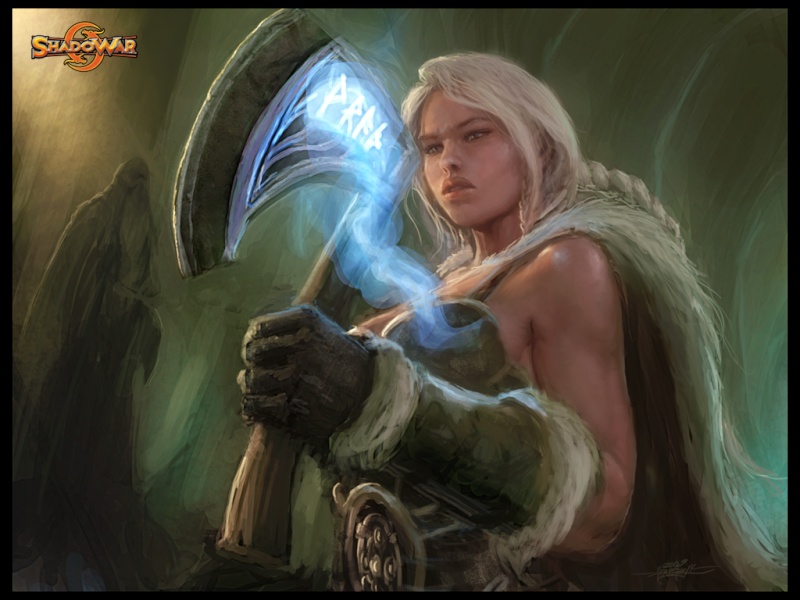
Sources:
http://www.wowhead.com/forums&topic=159013/a-guide-to-rping-dwarves
http://www.wowwiki.com/How_to_roleplay_a_dwarf
http://emeralddrama.com/index.php?topic=1182.0
http://www.quest.org/cg/dwarfpacket.pdf
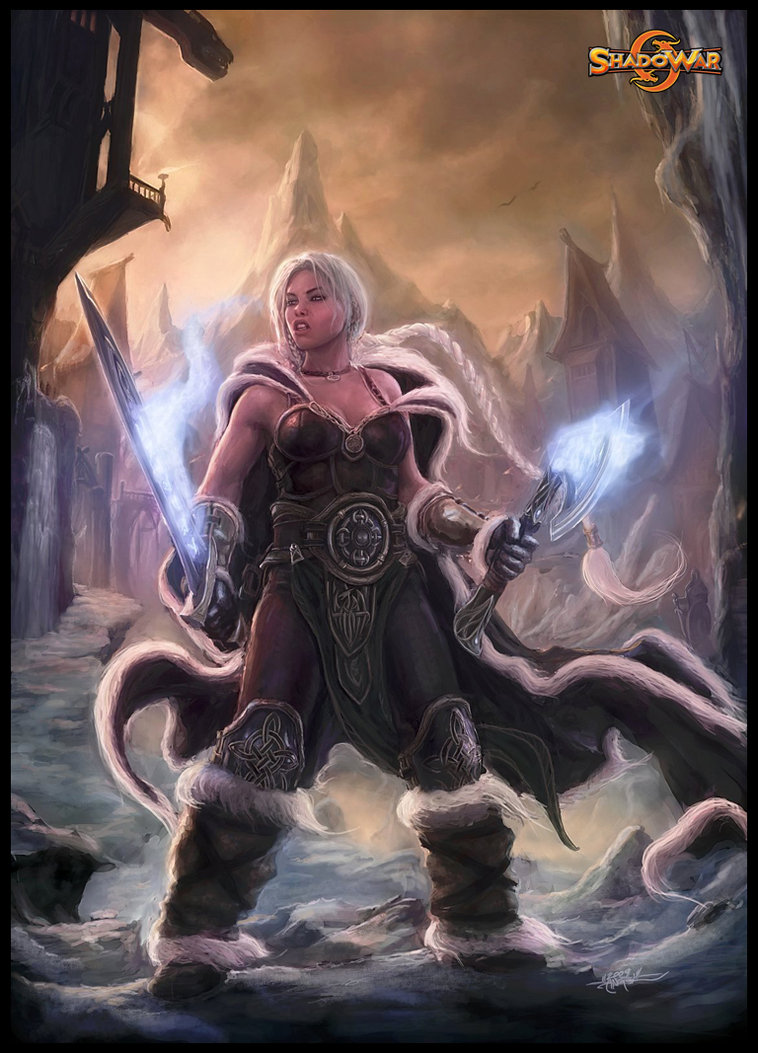
Dwarfs are by nature consummate craftsmen. Since the dawn of their people, they've always valued hard work and diligence. A common Dwarfen phrase is "Gold can be stolen, honor can be lost, but skill once obtained is eternal." This has led them to a conservative worldview as far as making things is concerned. Time-tried methods (and the time involved is usually centuries) are always used. New innovations take decades or more to take root.
Dwarfs also value age. History is a major part of Dwarfen culture, and age belies history. Their favorite weapons are usually centuries old, which is the mark of good craftsmanship. Unlike a manling cannon, for example, which will probably be replaced within the lifetime of the men crewing it, a Dwarfen cannon isn't even considered battle-ready until it has survived at least one hundred years of use.
Additionally, a Dwarf's word is his bond. Dwarfs are sometimes seen as evasive by outsiders because a Dwarf will never ever give his word to do a deed that he cannot or doesn't think he will be able to complete. The reason for this is the shame associated with failing his oath (which is what all Dwarf promises are, be they great or small) is so great that the Dwarf who did so would have to shave his head, leave his clan, and become a Slayer seeking death in the dark places of the Old World.

Names, names, names
All dwarves have three or four parts to their name. The first part of their name is the title.
Most dwarves have the title of Clansman or Clanswoman but nobles, knights, members of the
royal house and anyone else with a particularly important position will have a different title.
The second and third parts of a dwarf’s name are the given and family names. The player
can, more or less, make these up. Family names are generally two English words stuck together
and are inherited from the mother.
The family name of a Princess or Prince is the same as the name of the clan.
Lastly, some dwarves have an epithet which they add to the end of their names. Granting
epithets to members of the royal or noble castes is the province of the highest levels of dwarven
society and receiving one is a great honor. A noble dwarf would only be granted an epithet after
either a lifetime of honorable service or having completed a great deed for the clan. Players
considering such an epithet should be sure to figure out what was done before adding it to their
character.
However, for clansman, epithets are bestowed more easily. Although such epithets are still
bestowed by the clansman’s liege, they can be a mark of fondness just as much as they are a
mark of honor. These epithets also tend to be characterized by physical traits such as “the Tall”
or “the Strong” while noble epithets are frequently more graphic and relate to the holder’s
honorable deeds (“the Mighty,” “the Holy” and “the Bloody” are examples).
Players of dwarven characters are encouraged to make up a genealogy. Although this is
rarely necessary to play a character, it can be quite nice to have if you are playing a noble. Given
names are based on the parent’s name of the same sex. Therefore, a male player can make up the
name of his character’s father by changing a few letters in his character’s name. A female player
can do the same for her character’s mother. When giving a genealogy, use the form “X, daughter
of Y, daughter of Z.” (Substitute “son of” if you are male.)
If you do this well, there will be a nice rhythm to the genealogy since all of the names sound similar.
Lastly, although nearly every dwarf has a name of this sort, common usage tends to be a
good deal less formal. Even noble dwarves frequently grant their friends and companions leave
to address them less formally in private.
Most often, Dwarven last names are a combination of noun/verb such as Hammerthrower, or noun/noun such as Bronzebeard. First names vary, but M’s and K’s are seen a lot. R’s and N’s are around too. While dwarves like alcohol, don’t name your dwarf Beerthrower or something like that. There are very few alcohol related dwarf names.
Dwarfen names are mostly drawn from Old Icelandic with the final "r" removed or softened for ease of pronunciation. For example my name is taken from the Old Icelandic Ormr. Conventionally, Icelandic names tend to have hard consonant clusters and end in r. However, when they are anglicized this r is usually dropped after a consonant.
Dwarfs usually have four names when they reach full maturity. These are the personal name (I am Ormir!) the Patronymic (based on your father's name -- I am Ormir Snorrisson!) the deed-name (given to you by compatriots or a master for some trait or deed, I haven't been given one yet) and the Clan Name which is whatever clan your MOTHER was from (I am Grudgestone!)

Faith
Bronzebeards generally worship the Holy Light (seeing as their only spellcasters in WoW are Priests/Paladins), however come Cataclysm they will have Shamans and Mages and possibly Warlocks, which shows that the Bronzebeards are open to most forms of Religion (seeing as how Druidism will be pretty much the only form of “worship” not seen.)
Wildhammers are Shamanistic, druidistic and some (but very very few) practice the Holy Light. They kind of take the role of the Night Elves and Tauren in the Eastern Kingdoms, bringing nature worship.
The Dark Irons have, until recently, and perhaps still, worshiped the Elemental Being Ragnaros as a god. Now that he has been banished, it remains to be seen what they are.

Things to remember
There are a few rules that a dwarf roleplayer must always consider:
Dwarves have their own accent that heavily resembles that of the Scottish accent. Calling men Lads, Women Lasses, You is ye, Your is Yer and much more.... (For more of an example try listening to the Dwarf NPCs, or some of your vocal emotes.)
Dwarves express anger by mentioning something short or long.
For Example, a dwarf tripped and his ale spilled out of his mug: "Oh By Magni's beard!"
Or something longer: "Oh By Muradin's second solid yet nimble axe!" Or just: "BLAST IT ALL TE HELL!"
Not much is known about Dwarven beliefs or religions, but some follow the light, some believe in the titans, some are shamanistic, etc... You can make your dwarf believe in something unique to make him special.
There are multiple clans of dwarves, each with their separate cultures. Wildhammer dwarves are less technologically advanced as their Ironforge cousins, and prefer shamanism over feats of engineering.
Wildhammer dwarves usually have darker skin as opposed to their Ironforge dwarves. Dark Iron dwarves are on the fringes of dwarven society, likely the least respected. They're far more likely to delve into secret and forbidden magic.
This guide explains only just the basic dwarven ideas, there is still much more to learn about dwarves. Try to ask friends, complete quests, and read about them in more articles to make your dwarf the best dwarf you can!
Your character will most likely be a Bronzebeard or a Wildhammer. I can imagine a Dark Iron mercenary, but I doubt any redeemed Dark Iron warrior turned shaman will work.
Keep in mind that while dwarves love their brew, it is generally not a crippling weakness (note: there are quite a few exceptions to this).
Your dwarf does not have to be a miner/blacksmith/explorer. While these are the largest professions, if your character does something else it won’t matter too much.
Dwarves aren’t known for tact. Get over it.
Dwarves are generally physically stronger than almost all Alliance races, and can be on par with Orcs for pure muscle, (size is another matter).
Your dwarf will most likely have an innate understanding of machinery to the point where s/he can drive most vehicles after a little training (although you can’t just make some random device out of nowhere).
Dwarf women aren’t known for their beauty. This does not mean there are no beautiful dwarf women.
There is a split between dwarves who travel and those who don’t. Generally, they like to stay in Khaz Modan, especially Dun Morogh. However, there are many dwarves who travel outside as Explorers. While a priest is unlikely to be an explorer (although traveling priest I guess…) your hunter probably will. It all depends on what you feel like.

The Dwarven Accent
The Dwarven accent is basically a Scottish accent.
He points out a lot of the key pronunciation differences between Scottish and normal English. However the Dwarven accent itself is a more archaic form of Scottish English that still using some of the old English words like "ye" instead of "you" for instance.
For example:
"What are you doing?"
Becomes
"Whot er ye doin'?"
"What" becomes "Whot" because the Dwarven accent tends to have deeper sounding vowel.
Words like "dignity" might sounds more like "dug-ni-teh" coming from a dwarf. "Are" becomes "er" because its somewhat being added together with "What" to make a sound like "Water" when pronounced out loud. They also tend to shorten words that have "ing" sounds at the end. "Fighting" becomes Fightin' for example.
Words ending in "ly" are usually pronounced by a dwarf as "leh". So "happily" sounds like "happileh." You usually only need to do that if there is an "l" in front of the "y". Certain letters like "l" create extra syllables in the Scottish accent. So Dyin' would not be Dehin' for instance because the letter "d" unlike "l" does not create the extra syllable.
There are few word there you may or may not wish to add in that fit the accent well. Christine Golden uses these words often when she writes the Bronzebeard brothers in her Warcraft novels
Ken- know (EX: "I ken ye, lass.")
Bairn- A child of age just before puberty. (EX "A lot o' bairns in tha' orphanage there.")
Bony- Blonde or fair haired (EX: "Arthas, ye bony lad!")
There are mods you can use as well, but none of them are particularly great and I feel it personally takes away from your RP experience. It will take practice to get used to typing the accent and being able to stop typing it when you need to say something in your OOC channels.
The most important thing to remember though is: DO NOT GO OVERBOARD WITH IT! If you feel the meaning of your sentence is lost in your accent, you're doing it wrong.
Too often do I see
"Wot err ye dooin' i've g'ta g't som' 'elp o'er 'ere wit t'ese lads!"
The quality of your accent is not based on the amount of apostrophes you have in it, its the consistency of your accent that will garner attention.
"Whot er ye doin'? I've got tae get some help ovar here with these lads!"
gets your point across and is much easier to read.
I'd recommend also watching movies like "Braveheart" to kind of hear the Scottish accent in action and get feel for how you might type it out. It really helps. The key is to type the word how it "sounds" not how it is actually spelled (spelling Nazi's will hate you, but you're a Dwarf and therefore automatically superior to them in every way anyway) so you need to hear how it sounds before you can accomplish that.

Sources:
http://www.wowhead.com/forums&topic=159013/a-guide-to-rping-dwarves
http://www.wowwiki.com/How_to_roleplay_a_dwarf
http://emeralddrama.com/index.php?topic=1182.0
http://www.quest.org/cg/dwarfpacket.pdf

 Re: How to roleplay a dwarf : General guide
Re: How to roleplay a dwarf : General guide
Tulip, you have impressed me. Bookmarking this thread and throwing it to any dwarves looking to learn to role-play, nice use of imagery and neatly written all round!
Guest- Guest
 Similar topics
Similar topics» How to roleplay an Orc. A general guide from All the World’s Stage
» A Guide to Blood Elf Roleplay
» [Guide] Survival Guide for Cultists
» Brief Guide to Criminal Roleplay
» Guide to Guns in Roleplay
» A Guide to Blood Elf Roleplay
» [Guide] Survival Guide for Cultists
» Brief Guide to Criminal Roleplay
» Guide to Guns in Roleplay
Page 1 of 1
Permissions in this forum:
You cannot reply to topics in this forum